

Describe a time when you tried to do something that were not very successful Cue Card

Describe a live sports match that you have watched cue card
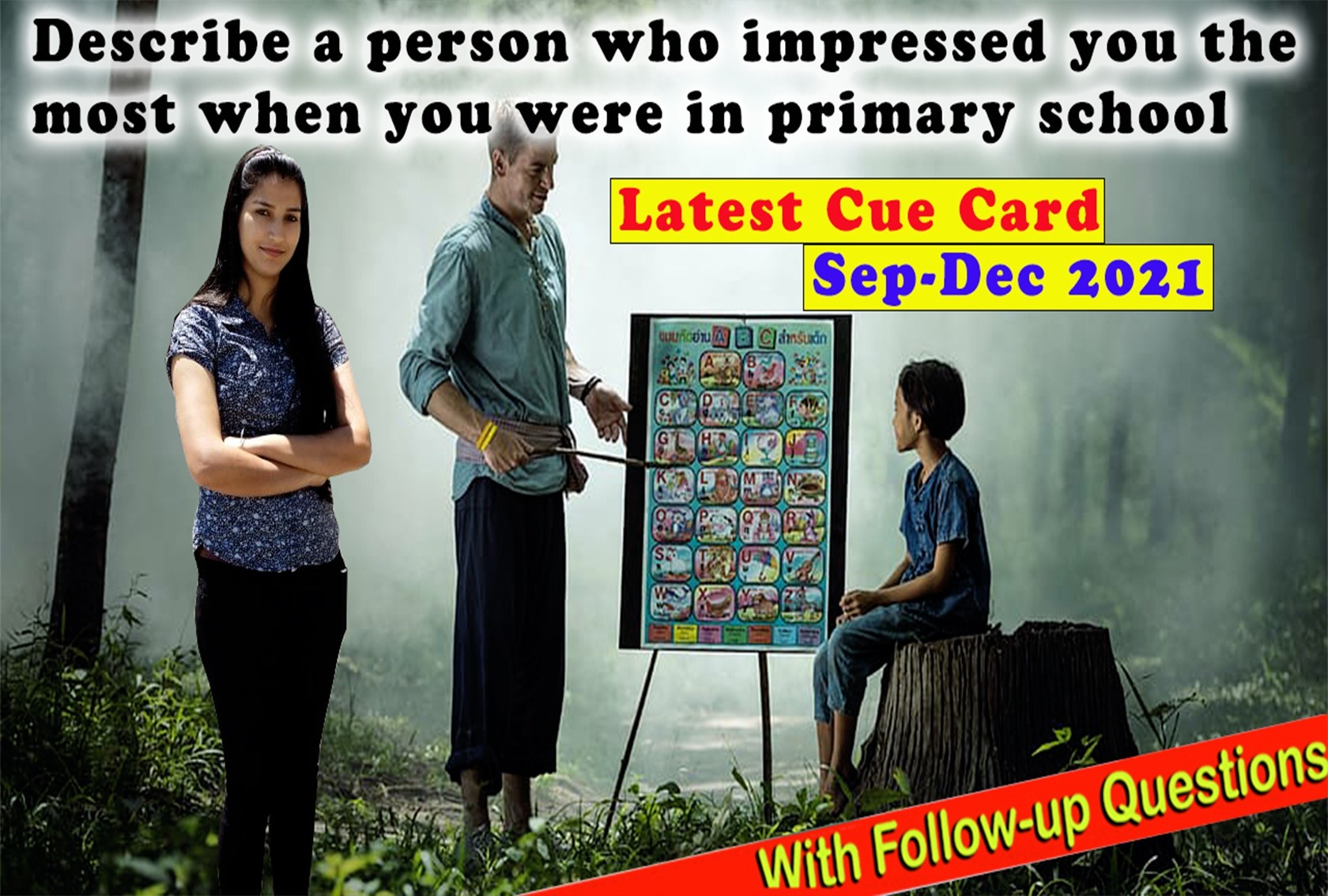
Describe a person who impressed you the most when you were in primary school Cue Card
Describe a journey to school | cue card | with follow up question, describe a journey to school | latest cue card | 8 band sample.
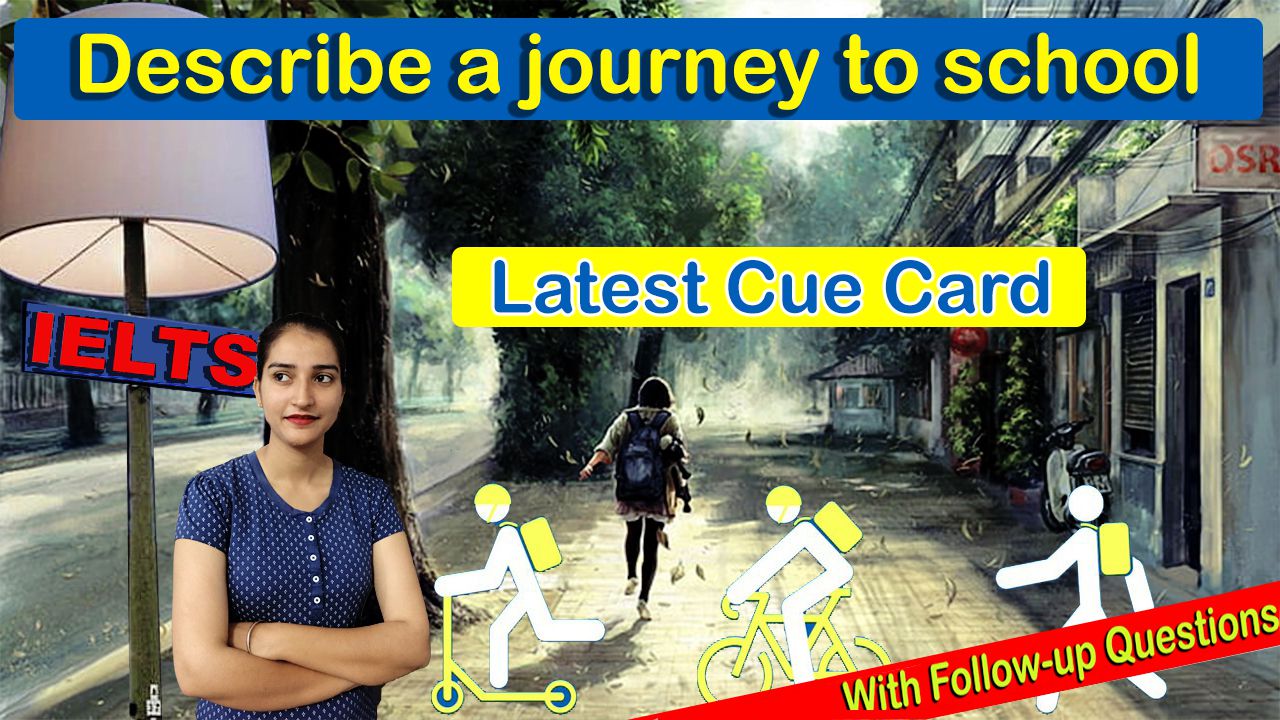
Describe a time when you forgot something important | cue card | with follow up question
How was that journey?
How did you go?
What did you do on the way?
Who was with you?
Do you need any improvement?
Time flies so fast. Looking back, my high school is just like a movie, a lot of things happened. My journey in School was scary, exciting, and successful. It is true that, Journeys are the part of life. Life itself a journey. It starts in childhood and on death it ends. I really remember my journey to school. After wishing a warm goodbye to my mother, I started off to school.
I saw a couple of students hurrying and getting into their vans and cars, while a few others preferred cycling just like I did. I kept on looking at the scenery and trees that made me feel cool and internally relaxed. I even saw a nest in which a bird was busy feeding its child. It was my first journey of life. It was memorable journey also.
When I was in 3rd class, I remember from that, I used to go by school by cycle. It was red colored cycle. I started my journey at 6a.m. School was far from my house and my school timing was at 7a.m. It took half an hour to 45minute for me to reach. It was great experience. I was not alone. My elder brother also went with me every day. While crossing a park on my way I saw two lovely squirrels, fighting over a nut and then running after each other, as if they were humans, this made me smile and love the bounties and creations of God. I looked up at the sky and again took a deep refreshing breath.
Before going to school, my mother give instruction strictly. We did lot of fun. Sometimes plucked the flowers from the garden. Sometimes we ran the race and shouted a lot. A group of friends joined us on the way. No doubt fun increased at that time. We ran race and shouted a lot and we rang the cycle bell a lot. Some people scold us and abused us. I was very particular about rules and regulations of road. Never crossed red lights. It was a great time. I needed improvement because my cycle was old and color was faded and seat was broken and tore also. It was delightful journey of my life which I never forget throughout my life.
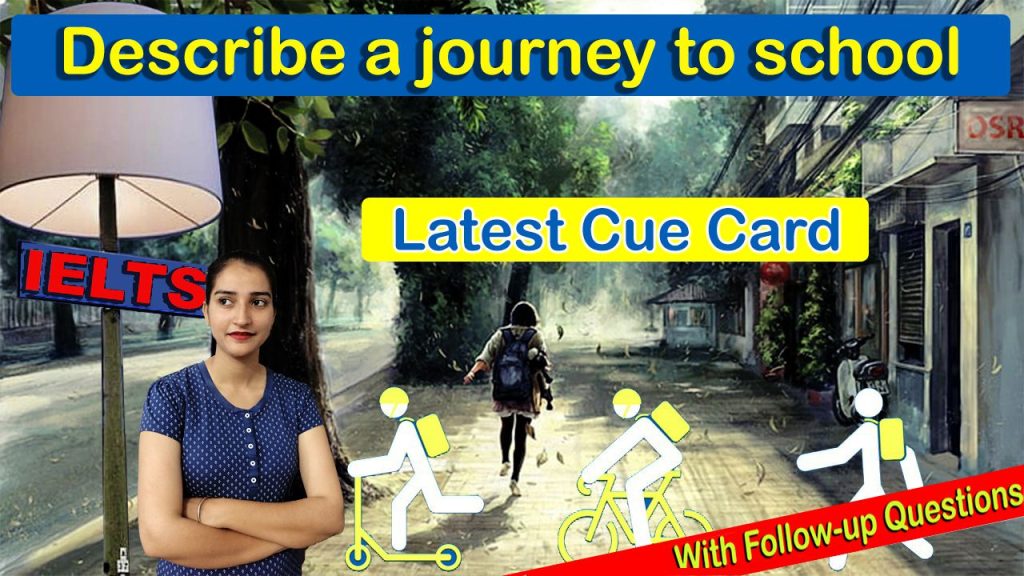
1. What mode of travel do you consider the safest?
I think earlier I considered travelling by car to be the safest but because of the increasing traffic and road accidents, I now consider train journey as the safest. So, whenever I have to travel long distance I travel by train. I also consider air journeys to be safe, but the recent airplane disappearances have made me less sure.
2. How do people travel long distance in your country ? I think the most common means of travel for majority of the people is train. However, with increasing incomes, many people have started travelling by air as well.
3. How can travelling be useful to people? What do you think people can learn by travelling to other countries? Travelling is useful in many ways. First, its one the best ways to meet new people and make friends. Secondly, it enables us to learn about new cultures and traditions. Travelling also in a way breaks the monotony of everyday life. There is something very enjoyable about planning a holiday and visiting other places.
4. Where, in our opinion, should people visit during the vacations? What type of places do you recommend people to visit during vacations? I have thought about it a lot. I think people should take vacations at a place, which is different from their own native place. For example, I live in the plains, so I love travelling to the hills and mountains. People who live in continental locations can visit the beaches. Ultimately though, it all depends upon people’s choice.
Latest Articles

Important IELTS Speaking Questions

IELTS Speaking Jumbo Cue card 2024
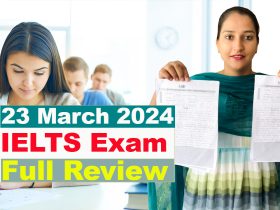
23 March IELTS Exam Review

Do and don’t in writing Task 2
Idioms for ielts speaking.
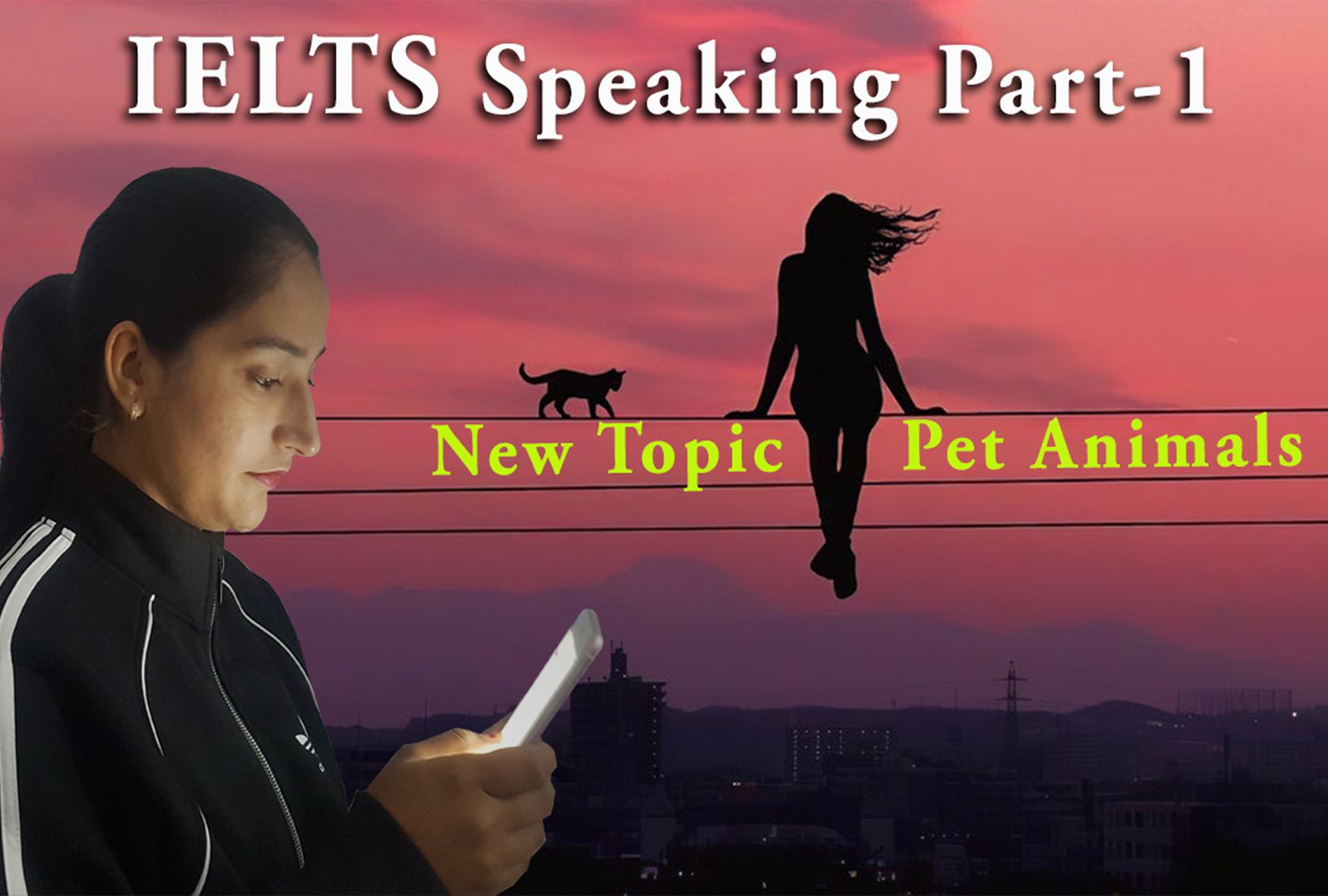
IELTS speaking part 1 Pets and animals
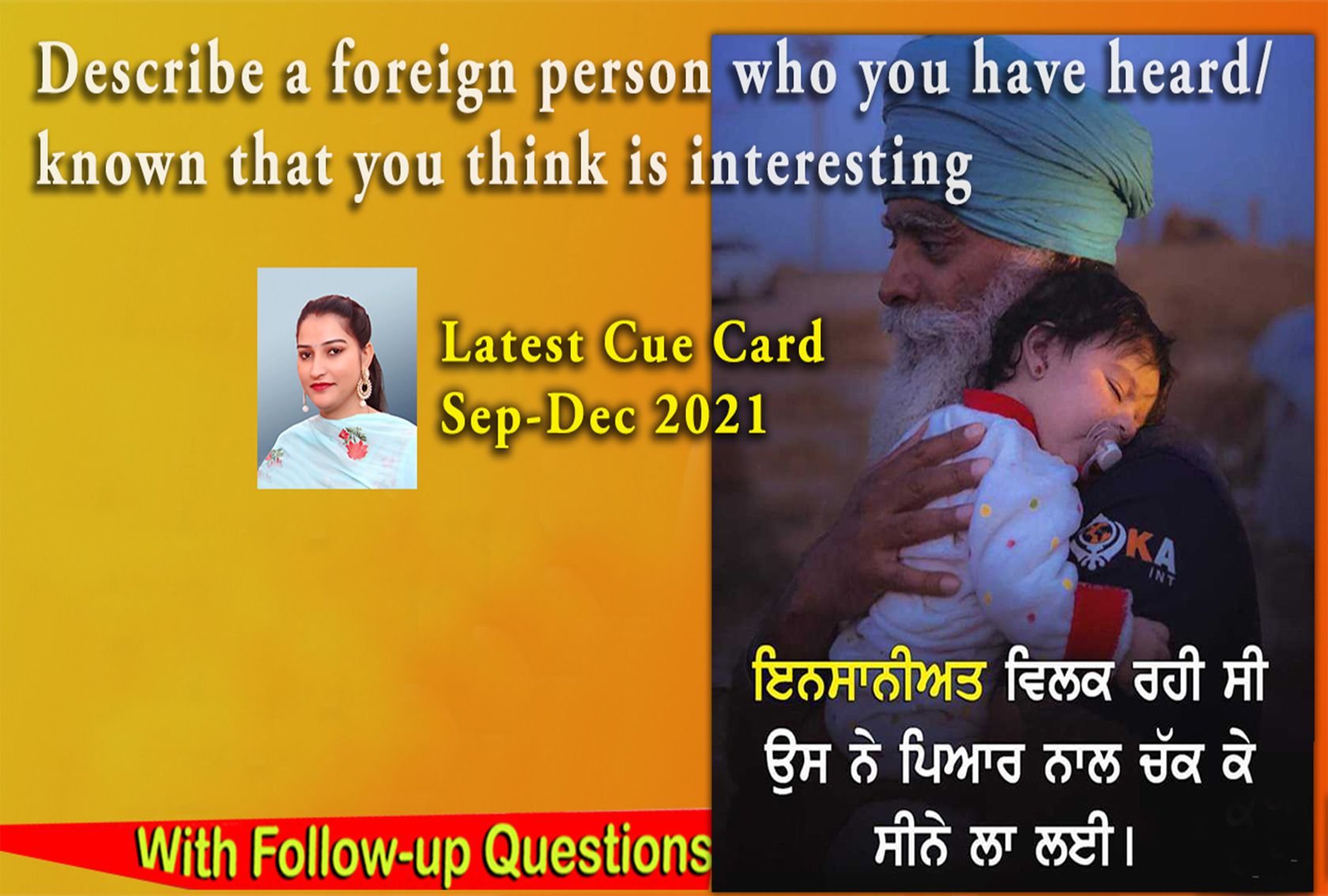
Describe a foreign person who you have heard/known that you think is interesting Cue Card

Describe a businessman you admire Cue Card
1.2 Your Academic Journey and Personal Story
Questions to Consider:
- How can your academic journey develop skills needed for college success?
- How can your personal story prepare you for applying to college?
Your Academic Journey
Now that you have a better understanding of what college can do for you, it is time to focus on how high school is preparing you for college, or better yet, how you can prepare yourself in high school to become college ready. It is clear that what you do (or don’t do) in high school can affect your ability to get into the colleges of your choice, but there is more to preparing yourself than just earning a high GPA or class rank. Your high school education can provide you with ample opportunity to help you hone your academic skills.
Take Difficult Courses
Any student who is serious about applying to college should consider taking challenging classes while in high school. Why? Because those classes can help lay a foundation of high expectations and hard work and they are often highly regarded by college admissions counselors. These classes are sometimes called Advanced Placement (AP), International Baccalaureate (IB), or honors/advanced classes. If you are considering taking such courses, talk to your guidance counselor or current teachers. They may be able to offer suggestions for how to get selected (if there is an application process) and give you a realistic picture of what will be expected. There is no need to take all AP, IB, or advanced classes to prove you are ready for college, but taking a few can provide a college admissions committee evidence that you are open to challenge.
Manage Time and Tasks
If there is one skill that you can develop now that will help you throughout your college career, it is the ability to manage your time and complete tasks. If you already use a planner to track what you need to do and when it is due , then you are on the right track. You can enhance these skills by setting reminders for yourself—and not relying on teachers or parents to tell you when to complete or submit an assignment. The most important part of managing your time and tasks effectively is to build in time well before something is due to complete the work and to overestimate (at least initially) how long you need, which can provide time “buffers” that will keep you from rushing through work to finish it.
Learn to Learn
Earlier, you were introduced to the argument that the purpose of college is to become a learner. You don’t have to wait until college, though, to figure out how best to learn different subject matters. This is one reason you should consider taking challenging classes–they require that you put more time and effort in them to learn the material. And those skills will make transitioning to college much easier. How can you “learn to learn”? You may have little control over what you are learning and how you are tested, but you can control how you approach the learning. One way to learn how to learn is to space out your learning over time (as best as you can—sometimes teachers like to give you a pop quiz when you least expect it!). Reviewing a bit of material for a short amount of time over several days (as opposed to cramming it in right before a test) produces better results. Another way to learn how to learn is to monitor how well your learning strategies work. Did you do well on a test? Take some time to reflect on what you did that resulted in a good grade. Did you space out your studying? Did you look for connections in the material? Likewise, if you do poorly on a test, determine what led to the result. The more you can identify what works and doesn’t for you, the easier it is to make improvements in your learning strategies.
Demonstrate Integrity and Ownership of Learning
Being a high school student often means having a lot on your plate. It can be easy to put off homework and studying, not do it at all, or cut corners to complete the work. While you may be able to get away with some stumbles like forgetting to turn in an assignment, other behaviors, such as getting someone (including Artificial Intelligence software) to do your homework or write a paper for you can get you into trouble. Now is the time to build the skills you will need later in college. Taking full responsibility for your learning as well as demonstrating integrity in all assignments no matter how big or small are the foundation of those skills. How do you do this? For one, you acknowledge that every action or inaction will produce a result. If you put in the work to write the paper, you will earn the grade you receive. If you do not put in the work or find a way to shortcut the process by using someone else’s writing, then you have missed an opportunity to improve your writing, your thinking, and your project management skills. Plus, you may get into trouble for academic dishonesty, which could mean failing an assignment or a course, or getting a more substantial punishment, such as expulsion. The stakes only get higher when you are in college.
Keep Test Scores in Perspective
You will learn more about standardized test scores and their purpose for getting into college later in this chapter, but it is worth noting that while what you make on the ACT, SAT, or equivalent standardized test, may factor into your ability to get into and pay for the college of your dreams, it is not necessarily a reflection of who you are and what you are capable of. Definitely do all you can to raise your test scores through practicing, prepping, and doing your best on the day of the test. But do not assume that a low test score will be the end of your long-term goals or educational journey. They are just one piece of information by which an institution may evaluate your potential, but it shouldn’t be the only thing that tells who you are.
Your Personal Story
Just as important as your academic journey is your personal story. You will need to develop and reflect on both for your applications to college and scholarships. Those who read about you will want to know not only about your accomplishments, but also your challenges and how you have overcome them.
What Makes You Unique
It may seem cliché to say “There is only one you!” But there is some truth in the fact that you are unique—there is no one else like you. To that end, you may want to draw upon those unique characteristics as you begin to shape the story that you will share with college admissions staff and scholarship committees. Will you be the first in your family to go to college? Do you live on a working farm and feed the goats, cows, and horses every morning before school? Can you ride a unicycle or juggle or both? There may be both personal characteristics as well as experiences that make you stand out from others, and if there are, consider weaving these details into the tapestry of your story. Start by making a list of your characteristics—no trait is too small or typical at this point. You can eliminate items later when you start building your story, but for now, create the list and add to it as you think of new things that you are or can do.
Getting Gritty
Many college essay prompts include an opportunity to share a time in your life in which you faced adversity and overcame it. For some students, this prompt is difficult for they have either not experienced a life-changing setback or not considered themselves challenged. It is important to remember that any setback or disappointment—no matter how inconsequential it may seem to you—can be the basis for an essay that responds to such a prompt. There is no need to embellish the circumstance if it is truly not harrowing, but it is acceptable to frame the experience as something that was difficult for you. Most readers of essays are less looking for a made-for-Hollywood story and more wanting to see someone who has demonstrated tenacity, resilience, and reflection no matter how big or small the adversity is. Even if you are not required to write an essay on a time in your life in which you failed or experienced disappointment, having a story handy for interviews (for scholarships, internships, or jobs) can help you share insight into your personality and strengths in a succinct way.
Finding the Themes of Your Life
In Katharine Brooks’ (2010) book You Majored in What? 3 she shares a writing and reflecting activity called “Wandering Pathways and Butterfly Moments” that guides readers through a series of prompts to develop a list of life experiences for the purpose of discovering what career pathway may be most fruitful for them to pursue. These life experiences could be as monumental as moving to a new state and starting a new school or they can be as mundane as spending the summers fishing. The goal of the exercise is to record what you have done or what has happened to you to get a sense of a “story.” These stories are built upon the connections and themes that you see in the experiences. Here are some of the life experiences Brooks wants you to consider when you are crafting your personal story.
- What have you done during the summer or holiday breaks from school?
- What did you play when you were a young child?
- What are some of your major life experiences (e.g. family events such as births, deaths, marriages, divorces)?
- What do people say you do well or have a talent for or seek you out for?
- What do you consider your greatest achievements?
- What jobs have you had?
- What groups have you belonged to?
- What awards have you won?
- What lessons have you learned?
- What do you like to do for fun?
- What kind of “secret” talent do you have?
The goal of answering the questions is to capture as much about who you are and how you have been shaped to develop clear connections among the life elements and create themes. These themes can drive your personal story that can share on a deeper level who you are or who you are becoming.
Consider this scenario: Raphael has taken the time to write down his life experiences so he can build his personal narrative. Some of the answers to the questions above include the following:
- Raphael’s jobs: lifeguard, babysitter for his nieces and nephews, tutor, art teacher for elementary students
- Raphael’s hobbies and interests: watching old movies, volunteering at the library, creating original jewelry from natural objects
- Raphael’s awards and accolades: he won a writing contest in 11th grade, his friends come to him for advice, he has earned high grades in all of his classes
- Raphael’s major life events: parents divorced when he was 6 years old, he started a new school in junior high, his aunt passed away when he was 14 years old
From this short list, Raphael can begin to draw out themes that he can use to create a detailed picture of who he is. He has found himself in teaching roles with his jobs. He has a love for the arts as evidenced by his hobbies. He is a good communicator evidenced by his awards and accolades, and relationships are an important part of his life. Raphael can use those themes—and details from his experiences—to craft his story as someone who has demonstrated an interest in connecting with and helping others by sharing his expertise and experience.
Recognizing the themes in your life helps you to describe how you've become the person you are now, and helps you to understand who you will become.
"For me, becoming isn't about arriving somewhere or achieving a certain aim. I see it instead as forward motion, a means of evolving, a way to reach continuously toward a better self. The journey doesn't end" —former First Lady Michelle Obama , Becoming (2018)
Analysis Question
In what ways is your academic journey in high school shaping your personal narrative? Describe how the following experiences are helping you “become":
- The classes that you are taking
- The activities you participate in as part of school (e.g., sports, performing arts, etc.)
- The learning that you are doing outside of school (e.g., community language class)
In what ways are your personal experiences shaping your story? Describe how the following experiences are helping you “become”:
- Major life events
- Favorite activities
- Awards and accomplishments
- Jobs or volunteer work
- 3 Brooks, K.(2010). You majored in what? Plume.
As an Amazon Associate we earn from qualifying purchases.
This book may not be used in the training of large language models or otherwise be ingested into large language models or generative AI offerings without OpenStax's permission.
Want to cite, share, or modify this book? This book uses the Creative Commons Attribution License and you must attribute OpenStax.
Access for free at https://openstax.org/books/preparing-for-college-success/pages/1-introduction
- Authors: Amy Baldwin
- Publisher/website: OpenStax
- Book title: Preparing for College Success
- Publication date: Jul 12, 2023
- Location: Houston, Texas
- Book URL: https://openstax.org/books/preparing-for-college-success/pages/1-introduction
- Section URL: https://openstax.org/books/preparing-for-college-success/pages/1-2-your-academic-journey-and-personal-story
© Sep 20, 2023 OpenStax. Textbook content produced by OpenStax is licensed under a Creative Commons Attribution License . The OpenStax name, OpenStax logo, OpenStax book covers, OpenStax CNX name, and OpenStax CNX logo are not subject to the Creative Commons license and may not be reproduced without the prior and express written consent of Rice University.
- E-mail: [email protected]

- IELTS Practice Tests
- Recent Actual Tests
- Speaking Part 1
- Speaking Part 2
- Speaking Part 3
- General Training Writing Task 1
- Process Diagram
- Mixed Charts
- Advantages & Disadvantages Essays
- Agree or Disagree Essays
- Discuss Both Views Essays
- Direct Questions Essays
- Problems/Causes & Solutions Essays
- Speaking Vocabulary
- Writing Vocabulary
- Collocations for IELTS
Describe your journey to your school or office

Describe your journey to your school or office.
You should say:
- what type of transport you use
- how long it takes
- whether you use the same type of vehicle always
and explain if you enjoy it or not.
[You will have to talk about the topic for one to two minutes. You have one minute to think about what you are going to say. You can make some notes to help you if you wish.]
Model Answer 1:
Travelling at least one hour, back and forth, from home to office and vice versa every day may seem to be an easy task on the surface, but when you are travelling at least five days per week, it suddenly doesn’t seem to be so easy unless your journey is reasonably comfortable.
Talking about my journey from my hometown (“Sintra”, which is one of the major tourist destinations of Portugal and a suburb of capital Lisbon) to my office in Lisbon, which fortunately never gave me any trouble for my last few years of journey mainly because I use the train to travel back and forth even though it costs me a little extra. I always try to travel by “urban” trains which only run between large cities like Lisbon to Porto and Lisbon to Sintra.
There are four different kinds of trains in Portugal, depending on the distance they travel. Anyway, it takes a good 30 minutes to reach my office from my home but it doesn’t feel that long due to the fact that the trains in my country are very comfortable with spacious seats and comfortable temperatures no matter what time of the year you are travelling. And that’s exactly why, I always try to travel by train unless, of course, there is a valid reason to choose other means of transportation.
I enjoy my train journey from my home to office and vice versa because most of the area between Lisbon and Sintra is really scenic and beautiful as Sintra itself is a beautiful tourist spot. In fact, Portugal is a very beautiful country with beautiful mountainsides, vineyards, olive trees and sparkling sea coast. Besides, the environment inside the train is remarkably peaceful with no unnecessary noise. Finally, I absolutely enjoy the train journey because it is never really dependent on weather and as such very reliable. By the way, I rather enjoy the “rhythmic” sound of a moving train as it helps me take a little nap during my journey.
Sample Answer 2:
Thank you very much for this nice cue card topic. I am a fourth-year medical student and I have to travel for an hour each day to reach my medical college. Now I would say how I travel to my college on a typical day and how I feel about the journey.
My father owns a car and I mostly use it to travel to and from my college. This is a Honda SUV and is quite comfortable. My college is around forty kilometres away from our home. Considering the road traffic, it takes me around an hour or so to reach there.
I would say, I enjoy this daily journey of mine. During my second year, I had to take public buses to commute to my college for about three to four months and the experience of commuting in public transportation was not pleasant. It killed more times per day than it does now. Comparing to this experience, I would say I am happy and content to have a private car to reach my college now.
I wake up at around 7.00 in the morning, eat my breakfast, and get ready for college. Afterwards, I call our driver to start the engine. The car leaves our house at around 7.40 am and reach our college at approximately 8.40 am. During this one hour, I mostly read a newspaper or an academic book. Sometimes, when I do not feel like reading, I enjoy the view on both sides of the road. The only time I dislike this journey when our car gets stuck due to the bad traffic. On some occasions, let’s say once or twice a month, the traffic is so bad that I have to wait for about two hours, double the usual time, to reach my college. Apart from the chocking traffic jam and delay, I mostly enjoy my journey to my medical college.
Sample Answer 3:
I am a doctor and work in a private hospital in the city I live in. The city dwellers often witness notorious traffic congestions and I am no exception. I really appreciate the opportunity to let me talk about my experience of commuting to and from my office.
I am lucky that the doctors in our city are privileged to have official transportation. The hospital, where I work, has a full spectrum of bus service that carries office staffs. Mercedes-Benz buses usually carry us and it can take around 20 people at a time. One of the designated buses picks me up from my home early in the morning, and sometimes in the afternoon based on my hospital duty schedule. I would say the bus is comfortable and I like to ride in it to commute to and from my office rather than taking my own car.
The hospital is around 60 miles from my residence and it takes me less than one and a half hour to reach there in the early morning. If I take the same journey in the evening – when the traffic is usually heavy, sometimes it takes me more than two hours.
As far as I know, the hospital authority has four buses that are exclusively dedicated to carrying the doctors and nurses of the hospital. So I take one of these four buses every day. They look so identical that it’s hard to tell the differences, you know what I mean. Since the drivers are also on shifting duty, I cannot be sure who will drive the bus the next morning!
I like the journey except for the time when the traffic is bad and we are stuck on the road. I usually carry a book or a magazine that I read on the bus. Sometimes, I listen to music and try to enjoy the side view. But often I have to be on the phone while I travel, though I do not like it very much, to discuss professional matters. On the way back home, I often take a nap to refresh myself and its funny that I can sleep for a while on the bus almost every day after a busy and tiresome working day.
Similar other cue card topics you should be able to talk about if you prepare for this cue card topic:
1. Describe something you do almost every day. 2. Describe one of your typical days. 3. Describe a journey that you recently made.
Describe a typical day in your life when you were a child
Describe a musical instrument you know how to play, leave a reply cancel reply.
Your email address will not be published. Required fields are marked *
POPULAR POSTS
Ielts listening practice test 204, 200 ielts speaking sample answers [pdf + audio], ielts recent actual tests [full pdf + audio], ielts books collection: 200+ books, audio & videos [frequently updated], hackers ielts reading, listening, speaking, writing [pdf + audio], ielts writing recent actual tests 2023 [frequently updated], ielts reading practice test 320, get ready for ielts listening, reading, speaking, writing [pdf + audio], ielts writing task 1 by simon [pdf] free, the key to ielts writing task 2 by pauline cullen [pdf + audio].

9IELTS is dedicated to providing free materials and resources for IELTS conquerors. Stay constantly updated with a wide range of ultimate tips, strategies, and practice tests to crack the high-stakes IELTS exam!
Recent Posts
Ielts listening practice test 59, cricket has become more popular than national sports, write to the manager accepting the job, the hours of leisure time spent by people in different age groups in someland, ielts reading recent actual test 49.
- Terms & Conditions
- Privacy Policy
© 2024 9IELTS . All Rights Reserved.
- Listening Tests
- Academic Tests
- General Tests
- IELTS Writing Checker
- IELTS Writing Samples
- Speaking Club
- Free IELTS Speaking Test Online
- Latest Topics
- Vocabularying
- 2024 © IELTS 69
Describe your journey to your school or office. v.1
Ielts speaking describe your journey to your school or office. v. 1.
- Structure your answers in logical paragraphs
- ? One main idea per paragraph
- ? Include an introduction and conclusion
- ? Support main points with an explanation and then an example
- Use cohesive linking words accurately and appropriately
- ? Vary your linking phrases using synonyms
- Try to vary your vocabulary using accurate synonyms
- Use less common question specific words that accurately convey meaning
- Check your work for spelling and word formation mistakes
- Use a variety of complex and simple sentences
- Check your writing for errors
- Answer all parts of the question
- ? Present relevant ideas
- Fully explain these ideas
- ? Support ideas with relevant, specific examples
- ? Currently is not available
- Meet the criteria
- Doesn't meet the criteria
- 6.5 band Describe a journey that you remember well. You should say: Where you wentHow you travelledWhy you went on the journeyand explain why you remember this journey well v. 3
- 6.5 band Descirbe a journey that you remember well. You should say: where you wenthow you travelledwhy you went on the journeyand explain why you remember this journey well. v. 2
- Learn a new language and get a new soul. Czech Proverb
- 6.5 band Describe a journey (e. g by car, plane, boat) that you remember well. You should tell. how you travelled, where you went on the journey, explain why you remember this journey well. v. 2
- 6.5 band Describe a journey which you enjoyed. Where you wentHow you travelledWhy you went on the journeyExplain why you remember this journey well v. 2
- One should not aim at being possible to understand but at being impossible to misunderstand. Marcus Fabius Quintilian
- 5.5 band Describe a typical day in your life when you were a child. v. 1
- 5.5 band Describe an activity that you do to concentrate on your study/work. v. 1
- A man who knows two languages is worth two men. French Proverb
- 5.5 band Describe an exciting experience in your life. v. 1
- 5.5 band Describe a person who has influenced you to do better in your life. v. 1
- To have another language is to possess a second soul. Charlemagne
Welcome Guest!
- IELTS Listening
- IELTS Reading
- IELTS Writing
- IELTS Writing Task 1
- IELTS Writing Task 2
- IELTS Speaking
- IELTS Speaking Part 1
- IELTS Speaking Part 2
- IELTS Speaking Part 3
- IELTS Practice Tests
- IELTS Listening Practice Tests
- IELTS Reading Practice Tests
- IELTS Writing Practice Tests
- IELTS Speaking Practice Tests
- All Courses
- IELTS Online Classes
- OET Online Classes
- PTE Online Classes
- CELPIP Online Classes
- Free Live Classes
- Australia PR
- Germany Job Seeker Visa
- Austria Job Seeker Visa
- Sweden Job Seeker Visa
- Study Abroad
- Student Testimonials
- Our Trainers
- IELTS Webinar
- Immigration Webinar
Describe a journey that you remember well – IELTS Cue Card
Updated On Dec 11, 2023

Share on Whatsapp
Share on Email
Share on Linkedin

Guide to Achieving Band 8+ on IELTS Speaking Cue Cards
In IELTS Speaking, you should focus on one idea only and then expand that idea into a long meaningful sentence using grammar patterns and vocabulary. So, try practising this topic for Part 2 of the cue card for your IELTS Speaking and achieve a good score!
Describe a journey that you remember well.
You should say:
- Where did you go?
- How did you travel?
- Why did you go on the journey?
Sample Answer 1
Last year, I had the pleasure of embarking on the most memorable trip of my life. It was a trip from Patiala to Shimla, which is a distance of around 160 miles by automobile. It was my first self-driving travel experience.
My friends called me a week before my 24th birthday to inquire about my plans. We decided to go to Shimla and celebrate my birthday there on the spur of the moment. After completing my driving lessons and acquiring my driver’s license, I advised doing the road trip in our car. So, I requested my father lend me his car.
I was accompanied by four of my closest friends. They were concerned since I had never driven in a steep area before. However, I assured them that the ride would be pleasant. We had no clue about the road conditions while planning the route, and it was made worse by leaving the highway for a time; anyhow, the following 10 kilometers or so were on some of the worst, never-ending roads. As a result, it took us around 4 hours to get to the Shimla hotel we had reserved. Regardless, contrary to my worries, driving on hills was not difficult, and this was the first lesson that gave me the confidence to drive on hills.
Overall, the journey was delightful. We all had a good time on vacation. Fortunately, because it was a holiday, the roads were mostly empty. However, it took a long time to get there since we stopped at numerous places for food and beverages. There was a lot of merriment there, and we weren’t in the mood to leave sooner.
Sample Answer 2
Journeys have always been an enjoyable part of my life. Every trip has taught me something fruitful, and I have become a better person at the end of every trip. Also, by planning and executing random trips, I have enhanced my observation skills to a great extent. The knowledge I have gathered through these trips is tough to accumulate through other means.
So, to tell you about a journey that is still immaculate in my conscious, it is the last travel that I arranged. So, all this while, I wanted to visit secluded and quaint places. However, my previous trip was to Ladakh – one of the dream places of almost every adventure lover.
Initially, I had decided to travel by cab as Ladakh is approximately 800 km from my place. But I changed this decision all because of one video on Instagram. While scrolling through this social media platform, I stumbled upon a video that showcased snow-laden mountains captured from an airplane’s window on the way to Ladakh. The mesmerizing beauty of those mountains compelled me to drop the idea of traveling by cab, and I booked plane tickets.
I am an adventure lover, and Ladakh is one of the prettiest places on the earth. I visited there for its scenic beauty, to try delectable cuisines, relish colorful local festivals, explore gompas and monasteries, and rejuvenate and relax.
Sample Answer 3
Journeys, after all, are always unforgettable. It exposes us to new experiences and allows us to unwind ourselves. I like traveling because it allows me to explore new places and experience new things around the world. However, there are certain travels on which I have had less than good encounters. I would like to discuss one such journey.
I went on a road trip with my friends around three months ago. It was my first extended road trip with my friends, and it was the most unforgettable event of my life. Because my friends and I don’t get to see each other very frequently due to our busy job schedules, we decided to take a long road journey from Punjab to Rajasthan. Ten of our friends decided to come along, so we managed two cars accordingly.
Everyone was requested to arrive at a mutually agreed-upon location on the scheduled day of the voyage. However, due to tremendous traffic congestion that none of us had expected, everyone was an hour late. Thus, our adventure began after considerable hardship. Nevertheless, because of the nature of the trip, it was a joyful and exhilarating experience for me. For a few hours, everything was working well, and everyone was having a great time. We were enjoying our little giggles, and the sight of the road flanked by trees. There was relaxing music playing in the background, and we were enjoying our fullest.
Suddenly, our journey was interrupted by accident. The first car in the lineup came to a complete stop because a youngster was crossing the road in a hurry, and the rest of the cars crashed because they couldn’t control their speed. Everyone was upset and anxious for a few hours. After that, everyone felt sad and worried. After that, the thrill of the trip vanished, and towards the end of the journey, we just hoped to reach our destination safely.
[do_widget id=custom_html-22]
- Unwind (verb) – relax after a period of work or tension. Eg : Music is a good way to unwind.
- Encounter (verb) – unexpectedly be faced with or experience (something hostile or difficult). Eg : I have had a brief encounter with a wild dog.
- Tremendous (adj) – very great in amount, scale, or intensity. Eg : We witnessed tremendous change in our country.
- Exhilarating (adj) – making one feel very happy, animated, or elated; thrilling. Eg : An exhilarating workout is a great way to start the day.
- Interrupted (adj) – changing direction abruptly Eg : The meeting was interrupted by a knock on the door.
Explore More Recall Cue cards >>
Related Cue Cards
- Describe a new year celebration that you still remember
- Describe something you remember from your school or college days
- describe a rainy day you can remember/
- Describe A Teacher From Your Past That You Remember

30 + Difficult IELTS Cue Card Topics with Answer pdf
Janice Thompson
Soon after graduating with a Master’s in Literature from Southern Arkansas University, she joined an institute as an English language trainer. She has had innumerous student interactions and has produced a couple of research papers on English language teaching. She soon found that non-native speakers struggled to meet the English language requirements set by foreign universities. It was when she decided to jump ship into IELTS training. From then on, she has been mentoring IELTS aspirants. She joined IELTSMaterial about a year ago, and her contributions have been exceptional. Her essay ideas and vocabulary have taken many students to a band 9.
Post your Comments
Recent articles.
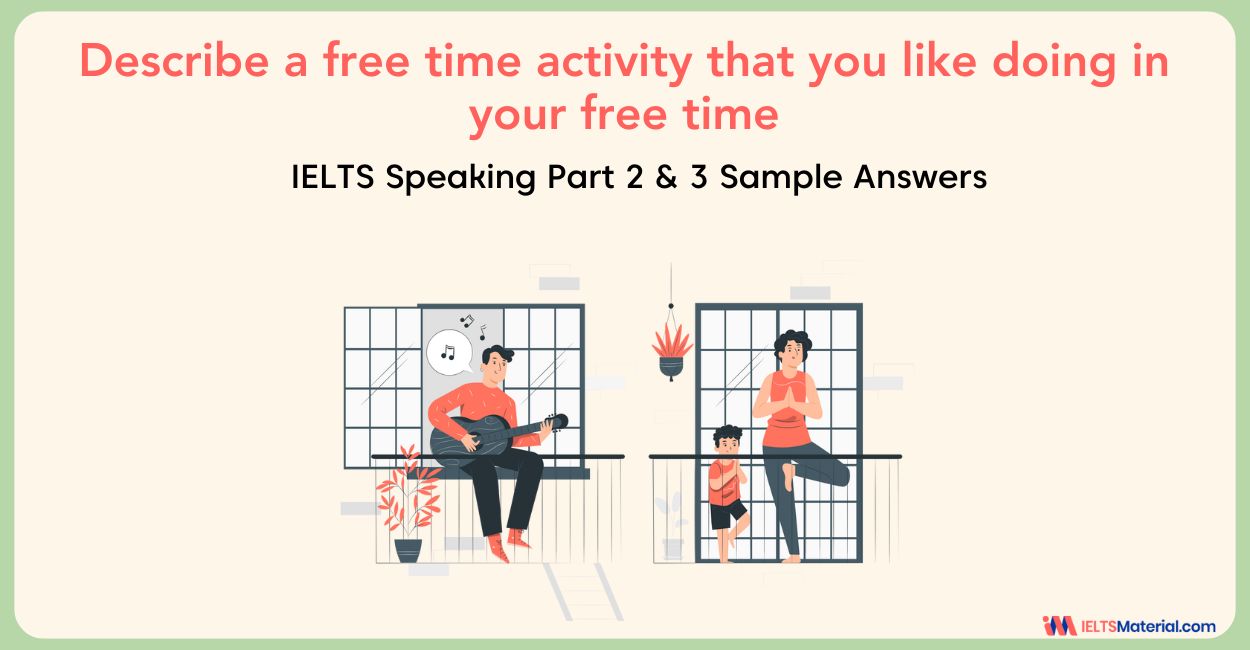
Kasturika Samanta

Raajdeep Saha

Our Offices
Gurgaon city scape, gurgaon bptp.
Step 1 of 3
Great going .
Get a free session from trainer
Have you taken test before?
Please select any option
Get free eBook to excel in test
Please enter Email ID
Get support from an Band 9 trainer
Please enter phone number
Already Registered?
Select a date
Please select a date
Select a time (IST Time Zone)
Please select a time
Mark Your Calendar: Free Session with Expert on
Which exam are you preparing?
Great Going!
IELTS Mentor "IELTS Preparation & Sample Answer"
- Skip to content
- Jump to main navigation and login
Nav view search
- IELTS Sample
IELTS Speaking Samples and Answers
Ielts speaking test - sample 96, ielts speaking test # 96, part one - introduction, part 2 - cue card / candidate task card, describe a journey [e.g. by car, plane, boat] that you remember well..
- where you went
- how you travelled
- why you made the journey
Part 3 - Two-way Discussion:
- IELTS Speaking
- Speaking Sample
- IELTS Speaking Mock Test
IELTS Materials
- IELTS Bar Graph
- IELTS Line Graph
- IELTS Table Chart
- IELTS Flow Chart
- IELTS Pie Chart
- IELTS Letter Writing
- IELTS Essay
- Academic Reading
Useful Links
- IELTS Secrets
- Band Score Calculator
- Exam Specific Tips
- Useful Websites
- IELTS Preparation Tips
- Academic Reading Tips
- Academic Writing Tips
- GT Writing Tips
- Listening Tips
- Speaking Tips
- IELTS Grammar Review
- IELTS Vocabulary
- IELTS Cue Cards
- IELTS Life Skills
- Letter Types

- Privacy Policy
- Cookie Policy
- Copyright Notice
- HTML Sitemap
- Skip to main content
IELTS Master
Your Personal Coach for IELTS Success
IELTS Speaking Part 2: Band 9 Answer for “Describe a Journey” Topic
In this IELTS Speaking lesson from IELTS Master, I give a Band 9 sample answer (including the script below) for an IELTS speaking part 2 topic on “a journey that you remember well”.
I also talk about how you can practice IELTS speaking on your own (without a partner) and highlight some interesting examples of useful expressions and IELTS speaking techniques that you can use on your test.
Watch more IELTS Master Speaking videos
IELTS Speaking Band 9 Sample Answer:
So I’d like to talk about a journey that I took when I was a little kid. Together with my family, I went to the Grand Canyon, which is a popular tourist attraction. It’s a national park in the United States. And I know we traveled by car. Umm, I can’t remember how long the trip was but I’d guess it was about a week. And the reason we went on this trip? Well, it was probably because my parents wanted to take me for a nice trip, a nice family trip.
That’s a common thing to do, um, with some families. But the reason I remember this journey so well is not because the Grand Canyon was amazing. I’m sure it was. But there was something else that happened while I was on this journey. And that was…on the trip…on our way to the Grand Canyon, um, we stopped by a book store. And, you know, I liked reading books a little bit when I was a kid so um, my I think my mom recommended this particular book to me. And I don’t remember what it was right now but we bought the book because she said “Oh this is a good idea. You might want to read this book.”
And so, she gave it to me and in the car, probably for about four hours or five hours, instead of looking out at all of the scenery and at all of these new places we were driving to, I just had my head in my book. I don’t think I looked up at all and I just read the book from cover to cover for like four or five hours…just sitting in the car in the back seat instead of looking at whatever beautiful nature they wanted me to look at. I know they gave me a little bit of a hard time about it, but, hey, you know, um, it was a memorable journey for sure (be)cause even to this day I still remember reading that book in the car and really enjoying it and having a really good time with it. So yeah, that’s my story.
Reader Interactions
July 17, 2018 at 9:16 pm
I am a student of IELTS.
September 13, 2018 at 2:32 am
I do not think that this is a 9 band answer,some points are not relevant to the topic and the candidate failed to fulfill the task achievement and proper response .This is worth to score 7
September 13, 2018 at 8:46 am
Task Achievement is not part of the speaking score. I suggest you take a look at the speaking band descriptors: https://www.ielts.org/-/media/pdfs/speaking-band-descriptors.ashx?la=en
September 21, 2018 at 2:28 pm
Is it ok to use transitional phrases when answering each question such as “My initial point would obviously be …” or “Moving onto the next area of when I traveled I remember …”? Does it sound like a native speaker?
September 22, 2018 at 9:47 am
I don’t think these kinds of phrases are common among native speakers. That said, I doubt they will lower your score and could help if they’re used correctly.
November 16, 2018 at 1:26 am
I am a student of ielts
September 1, 2019 at 10:54 am
The cleaning company performs cleaning of spaces of numerous sizes and setups.
The company’s professionals supply cleaning up with the help of modern-day technologies, have special devices, as well as likewise have certified cleaning agents in their arsenal. In addition to the above advantages, wines provide: favorable rates; cleaning in a short time; excellent quality results; greater than 100 positive evaluations. Cleansing workplaces will aid keep your work environment in order for the most effective job. Any type of firm is extremely essential atmosphere in the team. Cleaning up services that can be gotten cheaply now can assist to arrange it as well as supply a comfortable room for labor.
If necessary, we leave cleaning up the kitchen area 2-3 hrs after putting the order. You get cleaning up as soon as possible.
We give professional maid service for personal clients. Making use of European tools and accredited tools, we achieve optimal results as well as give cleansing in a short time.
We provide price cuts for those who make use of the solution for the first time, as well as beneficial regards to participation for regular customers.
Our pleasant team supplies you to obtain acquainted with beneficial regards to teamwork for corporate clients. We responsibly approach our tasks, tidy utilizing specialist cleansing items and customized devices. Our workers are educated, have clinical books as well as recognize with the nuances of getting rid of facility as well as hard-to-remove dust from surfaces.
We offer top quality cleaning for big enterprises as well as tiny firms of numerous instructions, with a discount rate of up to 25%.
Leave a Reply Cancel reply
Your email address will not be published. Required fields are marked *
This site uses Akismet to reduce spam. Learn how your comment data is processed .

IELTS Speaking Part 2: cue card; a long journey you went on; with notes and model answer
In this IELTS Speaking Part 2 post, we are looking at a topic or cue card on the topic ‘a journey’ or ‘a long journey that you went on’. This post will help you prepare for the topic card easily as it includes a plan or notes and a model answer .
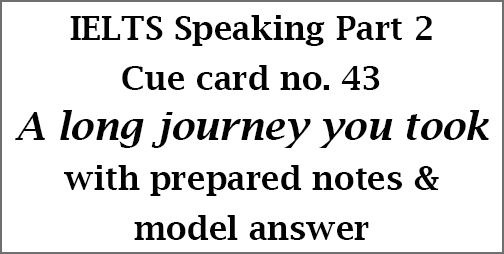
Let’s take a look at the topic card.

Notes taken in 1 minute before speaking for 2 minutes on the given topic:
For this topic card, you can decide to talk about any journey that you took in your life. You need to focus on the given points in your topic card.
Here, the topic card tells us to talk on the following points:
- where you went: the route of the journey from…to…
- how long it took: total time spent on the journey
- who you went with: your companions on the trip
- explain why you went on that journey: give some details of the journey
Here is a note made by me for this card. Match the notes with your own and see if there are some similarities.
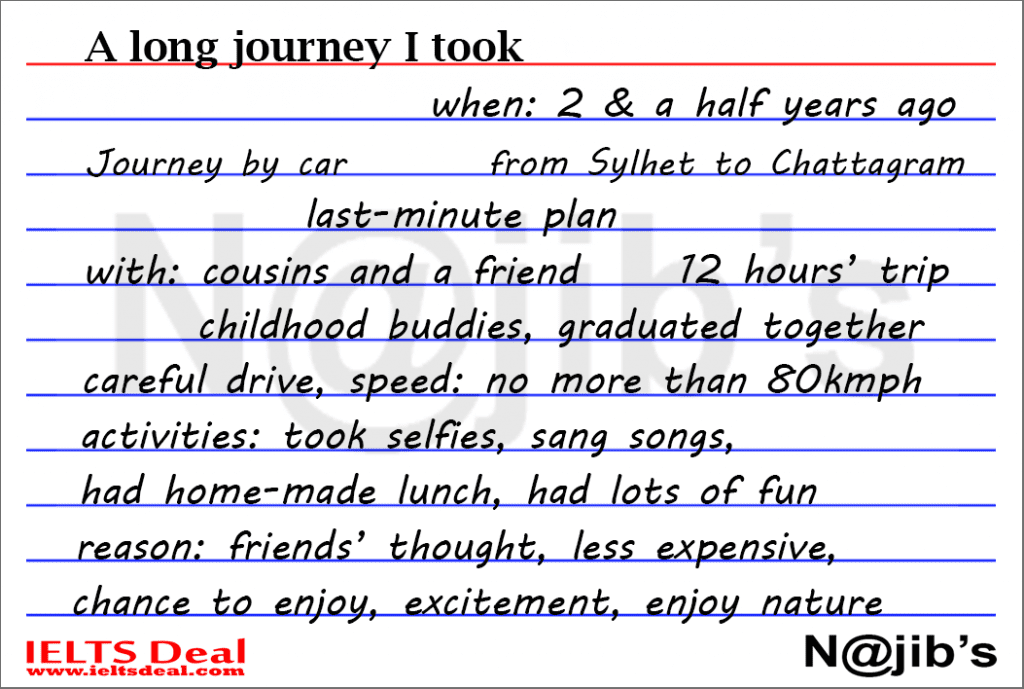
Model answer:
I have made many journeys in my life due to various purposes. For this topic card, I’m going to talk about a journey that I made by car because I recall it for the wonderful experience and fun I got during this journey.
I, along with two of my cousins and a friend, went to Chattagram, the business capital, and the place of the scenic beauty of my country about two and a half years ago. It was just a last-minute plan for us to decide to take a car instead of travelling by train. All four of us had received our driving permit and owned personal vehicles. So, we decided that we would rather drive there.
It took us around 12 hours for us to reach Chattagram from my residence in Sylhet. In fact, we could have reached there earlier, but being careful drivers we drove slowly bearing in mind the safety of each other. I never overlapped the limit of 80 kilometers during this long drive. In addition, we had two breaks on the freeway which also prolonged our journey.
My friend Shakeel and my cousins Reesah and Farah accompanied me on the journey. All of them are my childhood friends too and we have studied and graduated from the same university together. We also live in the same town. Besides, our families also are on good terms with theirs. Thus, I was certain that if I take them on this journey, it will be a journey worthy of remembrance. We did lots of fun on the way to Chattagram. We took selfies on our smartphone and had delicious home-made lunch prepared by Reesah and Farah. We sang songs loudly and smiled a lot. The wonderful sceneries around us and our favourite music in the car made the whole journey more thrilling and enjoyable. It was really a day of excitement and enjoyment.
As far as the reason goes, I decided to make this journey by car because my companions thought that it would be more amusing and relaxing. Not only that, but the air-tickets were also expensive for us and we did not want to spend a large sum of money just for a couple of hours’ flight. I believe it was the best decision to make and it proved to be so.
If you find this topic card interesting, here are links for some other topic cards for you.
1. An important email/letter you received
2. An enjoyable place you visited
3. A problem that affects the environment in your area
4. A plant grown in your country
5. A difficult choice/decision you had to take
6. A hotel you have stayed in
7. A party you have attended
8. A stressful day at work/school/university
9. A building with architectural interest
10. An English lesson you enjoyed/took
Leave a Reply Cancel reply
Your email address will not be published. Required fields are marked *
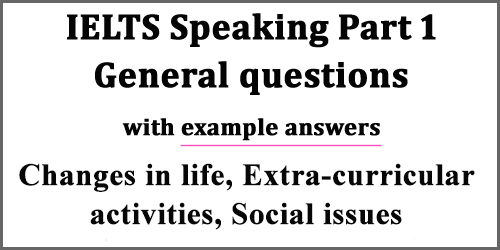
IELTS Speaking Part 1: General questions on Changes in life, Extra-curricular activities, Social issues; with model answers
This is the fourth set of general questions of IELTS Speaking Part 1 with example answers. If you wish to earn a good band score in the speaking module, you have to start with a great impression on the examiner’s mind and part 1 is the best place to do it. Practicing the general questions over […]
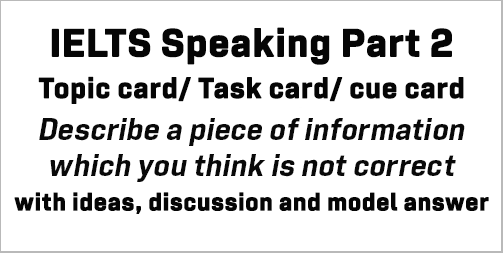
IELTS Speaking Part 2: Topic card; Describe a piece of information which you think is not correct; with discussion, model answer and Part 3 questions
In this post on IELTS Speaking Part 2, I’m going to discuss a topic card that has recently appeared in some IELTS tests around the world. Here we are going to describe a model answer for the topic ‘a piece of information which you think is not correct’. You will find a short discussion on […]
- Practice Test
- Useful Tips – Tricks
- Full Writing Review
- General Writing Task
- Writing Task 1
- Writing Task 2
- Writing Exercises
- Writing Sample – Topics
- Writing Vocabulary
- Speaking Vocabulary
- Intro Question
- Speaking Part 1
- Speaking Part 2
- Speaking Part 2 – Audio
- Speaking Part 3
- IELTS Books
- Recent Exams
- IELTS Vocabulary
- Essay from Examiners
- IELTS Ideas
IELTS App - For Mobile
Ready for the IELTS exam with our IELTS app. Over 2 million downloads

Popular Last 24h
Writing task 1: the percentages of the canadian workforce in five major industries in 1850 and 2020, writing task 2: many children find it difficult to concentrate on or pay attention to school., describe a family member who has had an important influence on you, talk about a beautiful city (chandigarh), describe a quiet place where you would like to spend time, writing task 1: changes in the birth and death rates in new zealand between 1901 and 2101., line graph #27 – the percentage of new zealand population from 1950 to 2050..
- IELTS Test/Skills FAQs
- IELTS Scoring in Detail
- Forecast Speaking – 2023
- List IELTS Speaking Part 3
- List IELTS Speaking Part 1
- IELTS Writing 2023 – Actual Test
Our Telegram
Join our community for IELTS preparation and share and download materials.
The information on this site is for informational purposes only. IELTS is a registered trademark of the University of Cambridge ESOL, the British Council, and IDP Education Australia. This site and its owners are not affiliated, approved or endorsed by University of Cambridge ESOL, the British Council, or IDP Education Australia.
Latest Articles
Ielts speaking part 3: topic relax, ielts speaking part 1: advertisements (audio), most popular, describe a film that made you laugh, describe a person whom you met for the first time and made you happy, topic: experience is the best teacher, describe something difficult you would like to succeed in doing, in many countries,today there are many highly qualified graduates without employment..
ieltspracticeonline All Rights Reserved

What is IELTS Score?
IELTS score between 1 and 9 for each part of the test – Listening, Reading, Writing and Speaking. You can score whole (e.g., 5.0, 6.0, 7.0) or half (e.g., 5.5, 6.5, 7.5) bands in each part. Universities often demand an IELTS score of 6 or 7. They may also demand a minimum IELTS score in each of the 4 sections.
IELTS scoring system and band scale
The IELTS scoring system is very unique composed of 9 bands, measured in consistent manner and is internationally acclaimed and understood. The IELTS score ranges from 1 to 9 for each part of the test. The individual result from these four parts will produce an overall band score ... more →
How long does it take to do the IELTS test?
IELTS has four parts – Listening (30 minutes), Reading (60 minutes), Writing (60 minutes) and Speaking (11–14 minutes). The total test time is 2 hours and 45 minutes. The Listening, Reading and Writing tests are done in one sitting.
Is IELTS valid for 3 years now?
The IELTS Test Report Form (TRF) is valid for two years. At present, IELTS score is valid for a three year period for Australian General Skilled Migration (GSM) applications.
Is there any pass or fail in the IELTS exam?
There is no pass or no fail in the IELTS exam. Generally, when you take any test or exam then there can be the possibility of getting passed or failed. But here in this case, you will not get failed but you may be disqualified to continue your higher education in choice of college or university.
Home → IELTS Cue Cards
Ielts cue cards – describe a journey you went on, follow-up questions.
- What are the importance of traveling?
- What type of places do you recommend people to visit on vacation?
- What places do you want to visit in future? Why?
Possible answer the above speaking cue cards
I like visiting famous places and whenever I get a vacation, I try to visit new places or places that I have heard about. One such trip that I took with one of my friends was a journey to Holland. I would like to talk about this tour to Holland that we took 2 years age.
Both of us (me and my friend) wanted to visit Holland and specifically Amsterdam, Hague and Rotterdam very much because we saw pictures and heard stories from friends about how beautiful and wonderful the place is. So finally we applied for the visa, bought plane tickets, booked a hotel, packed our bags and our trip began.
We spent a lot of time before our holiday, researching of all the interesting places to visit and all the sights to see. So we went to Risks museum, Van Gogh museum, Amstell Beer museum, took a romantic sunset cruise in the water channels, drove to Volendam, a small prettiest fisherman village, visited a cheese farm. We went to Rotterdam, which is the architecture city of Holland that stimulates innovation. We enjoyed the architectures and building there as much as we did walking in the neat roads and besides the beaches. Visiting the famous Anne Frank house was an exciting moment for me. I’ve read the Anne Frank’s Diary in my early childhood and witnessing the place was very much exciting.
Every evening we took long walks along the channels, resting in small gardens, which Amsterdam has a lot of. Street artists were performing everywhere and a lot of people came to watch their show.
We enjoyed very much everything we did and especially in such a beautiful country. Having my friend by my side on this trip made it even more fun. Since we have never been to Holland, everything we saw and did seemed interesting and completely new to us. The people, their way of interpreting their culture attracted us very much. Before leaving the place, both of us agreed that the place is worth visiting and someday we would come back to re-explore it.
Tips for answering this cue card question
You are free to talk about any journey you are comfortable to talk about. It can be a journey to another city of your country, to a historic or tourist place, a foreign country or to a relative or friend’s house to a different location. While talking about this cue card, take some notes of a journey you remember particularly where you went, what was the purpose of going there, how you traveled there, what you saw on your way and at the place, what you did, how long you stayed, whom you met there, who you went there with.
If you liked the journey tell about some exciting things you watched and did there than the usual things you do. For instance: you can mention some of the great places you visited there, the sightseeing of the journey. Do not focus too much on the place you went rather emphasis what happened on the way. This cue card is a bit different that ‘Describe a place you have visited’ where you would mostly describe things you watched and did on the place but for this cue card you should mostly tell about your experience during the journey.
Some key points to mention for this cue card
- You had the plan to visit this place for a long time and when you had the journey, you had been excited about the whole thing.
- You would meet a friend or relative after a long and that made you feel good.
- You have some memories related to this place and visiting there was a good experience for you.
- If this is a foreign country, say that you had a longing to visit this country.
- The weather was comfortable and there was no interruption on the way.
- You had friends with you and you enjoyed their company as well as the vehicles.
- This was not a typical journey that you usually take.
- The natural beauty surrounding the roads was charming.
- You observed some different custom and culture there.
Related IELTS Resources
Take a practice test to find out what is your current weakness in terms of IELTS scale and allow more time to improve your weak spots. The following IELTS resources will help you to develop your skills faster:
- IELTS Listening Test
- IELTS Reading Test
- IELTS Writing Task 1
- IELTS Writing Task 2
- IELTS Speaking Part 1, 2 & 3
- IELTS Listening Exercises
- IELTS Reading Exercises
- IELTS Cue Card Exercises
- How to Start IELTS Preparation
- Tips – On the Day before IELTS Exam

IELTS Cue Cards – Historical place
Ielts cue cards – a book that had a major influence on you, recommended for you.
IELTS Cue Cards – Describe a small business you want to start
IELTS Cue Cards – Describe a sport you enjoy playing
IELTS Cue Cards – Important event in your life
Comments (0), leave a reply cancel reply.
You must be logged in to post a comment.
IELTS Cue Card
A website dedicated to IELTS Cue Card Samples, Speaking Samples, and Speaking Preparation Guideline...
Search This Blog
Describe a journey that you remember well, describe a journey [e.g. by car, plane, boat] that you remember well..
- where you went
- how you travelled
- why you went on the journey
Idea Generation for this Cue Card:
- A journey you took to visit a famous tourist spot in your country.
- A journey to a foreign country.
- Your first experience of walking a long distance.
- A mountain hiking.
- An expedition or a tour you took while you were in school.
- A journey you made by boat.
- A journey to a remote area of your country.
- An experience when you visited one of your relatives.
- A tour you took recently.
- Your experience of visiting a new city. (Focus on the journey, not the city.)
- A journey you made with your friends.
- A journey that took unusually long time.
- A journey when something unusual happened.
Part 3: Details Discussion:
- Describe journey you recently had.
- Describe an exciting journey or tour you remember well.
- Describe a long journey you have had.
- Describe a time when you visited a village.
- Describe a tour you really enjoyed.
- Describe a train journey you have had.
- Talk about a journey that was too long.
- Describe a tour you had when you were a teenager.
Popular posts from this blog
Describe a time when you were very busy, important skill you learned when you were a child, person in your family who you most admire, describe your favourite movie/film.

Today's Paper | April 09, 2024
Reflections: my journey to school.
Carrying my heavy bag pack over my shoulders, I stepped out of my house, ready to leave for school. My school was around a kilometre away from my place, and so I preferred walking instead of going in a school van .
After wishing a warm goodbye to my mom, I started off to school. I saw a couple of students hurrying and getting into their vans and cars, while a few others preferred walking just like I did. I kept on looking at the scenery and trees that made me feel cool and internally relaxed. I even saw a nest in which a bird was busy feeding its child.
Then I saw an old woman holding a stick in one hand and a heavy shopping bag on the other, walking in front of me. I felt, she was in pain and difficulty, carrying the heavy bag and so I instantly moved towards her and helped her carry the bag up to her home.
She gave me a pleasant smile and patted me on my shoulder saying, “May God bless you, my child.”
This made me feel very happy and proud of my act. I reached the pathway and continued with my journey. I felt the cool air pass by that even made some tree swing hard. Suddenly a branch of tree overhead fell beside me with a hard sound. This made me jump and say, “I thank God it didn’t hurt me.”
While crossing a park on my way I saw two lovely squirrels, fighting over a nut and then running after each other, as if they were humans, this made me smile and love the bounties and creations of God. I looked up at the sky and again took a deep refreshing breath.
I moved further and a few minutes later I came across a beautiful pond with two gorgeous swans swimming in it. I moved over to it and offered a piece of a biscuit I was having, to one of the swans who gulped it instantly, I moved my hands over her fluffy fur and felt the softness.
I was about to offer it another piece of biscuit, but, that lovely creature moved away. I touched the water, splashed it towards it and then continued with my journey. I kept on walking looking around, feeling fresh, when I arrived near my school gate. I smiled remembering my delightful journey and went inside.

The gift of sibling friendship

Story time: Spreading joy on Eid

ڈان انویسٹی گیشن: بحریہ ٹاؤن کراچی کی مسلسل غیرقانونی توسیع کی مشکوک کہانی

سکندر اعظم نے کس بادشاہ کی موت پر کہا کہ ایک بادشاہ کو اس طرح نہیں مرنا چاہیے؟

‘زخم اور ہڈی ٹوٹی ہوتی تو بریانی کیسے بناتا؟’، انور مقصود کی افواہوں کی تردید

Why Has Nicaragua Taken Germany To ICJ Over Israeli Assault On Gaza?

Why Every Third Pakistani Suffers From Psychological Problems?

Is US Presence In Africa At Risk?

What’s Next For Israel?

This Week’s Must-Know Headlines: US On High Alert For Iran Threat Following Israeli Strike In Syria

Let’s Talk About This

Pakistan Denounces Indian Minister’s “Provocative” Remarks

ICJ: Colombia Joins Genocide Case Against Israel
Dear visitor, the comments section is undergoing an overhaul and will return soon.
Latest Stories

Saudi says Eidul Fitr to start Wednesday

Iran FM opens new Syria consulate after deadly Israeli strike

At least 94 dead in Mozambique after unlicensed ferry boat capsises

HRCP expresses concern over ‘alarming deterioration’ in law and order in Karachi

PM Shehbaz, Crown Prince Salman agree to expedite $5bn Saudi investment in Pakistan

LHC sentences lawyer to 6 months in jail for misbehaving with judge

Bored of the same old? Here are 9 irresistible recipes to level up your Eid spread

Adnan Siddiqui comparing women to flies was bad, his non-apology is worse

Amna Ilyas and Junaid Khan sue producer over the cinema release of their telefilm Hum Tum Aur Woo
Most popular.

Unexpected strawberry crop spins Burkina Faso’s ‘red gold’
Foreigner, five pakistanis kidnapped, robbed in islamabad.

World Bank wants unified GST collection agency

PM Shehbaz meets Saudi crown prince in Makkah

Cartoon: 6 April, 2024

Israeli embassies ‘no longer safe’ after Syria strike: Iran

Govt announces 4-day Eidul Fitr holidays from April 10
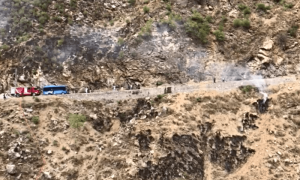
‘Bus carrying Chinese was not bombproof’

Man in Karachi sentenced to 80 lashes for denying child’s paternity
Six months on: the annihilation of gaza.

Editorial: It has been six long months — the destruction and bloodlust in Gaza must end now

Muslims face dwindling representation in Modi’s India

Some serious constitutional and legal questions have arisen in the aftermath of Senate polls

What have Muslim countries done to stop Israel from committing ethnic cleansing and war crimes?

Senate election controversy

Defiance and devastation

Human hierarchies

The Rs400bn quandary

Never-ending insurgency

Merchants of death
Water crisis, reliving heritage, beyond rhetoric, inclusive politics, new jamaat chief, liberty power confident its $125m bet on power sector will reap reward.

- Conjunctions
- Prepositions
550+ Adjective Words To Describe Journey

A journey is an adventurous and exciting experience. It is a journey of self-discovery and growth. It can be physical, mental, emotional, or spiritual. It can be a journey to a new place, or a journey within yourself. It is full of ups and downs, twists and turns. It is a journey of learning and discovery. Here are some adjective words to describe journey. It is a wonderful, amazing, and transformational journey.
A journey can be short or long, easy or difficult, but always rewarding. It is a chance to step out of your comfort zone, and into the unknown. It is a chance to learn about new people, and new cultures. It is a chance to test your limits, and push yourself to your boundaries. It is a chance to grow, and to change. A journey is an adventure.
Table of Contents
Adjective For Journey
A journey is an adventure, a exploration. It’s a time to discover new places, people and experiences. It’s a time to grow and learn. It can be long or short, easy or difficult, but it always has the potential to be life-changing. Here are some words to describe a journey: A journey is an adventure. It’s a time to explore new places, people and experiences.
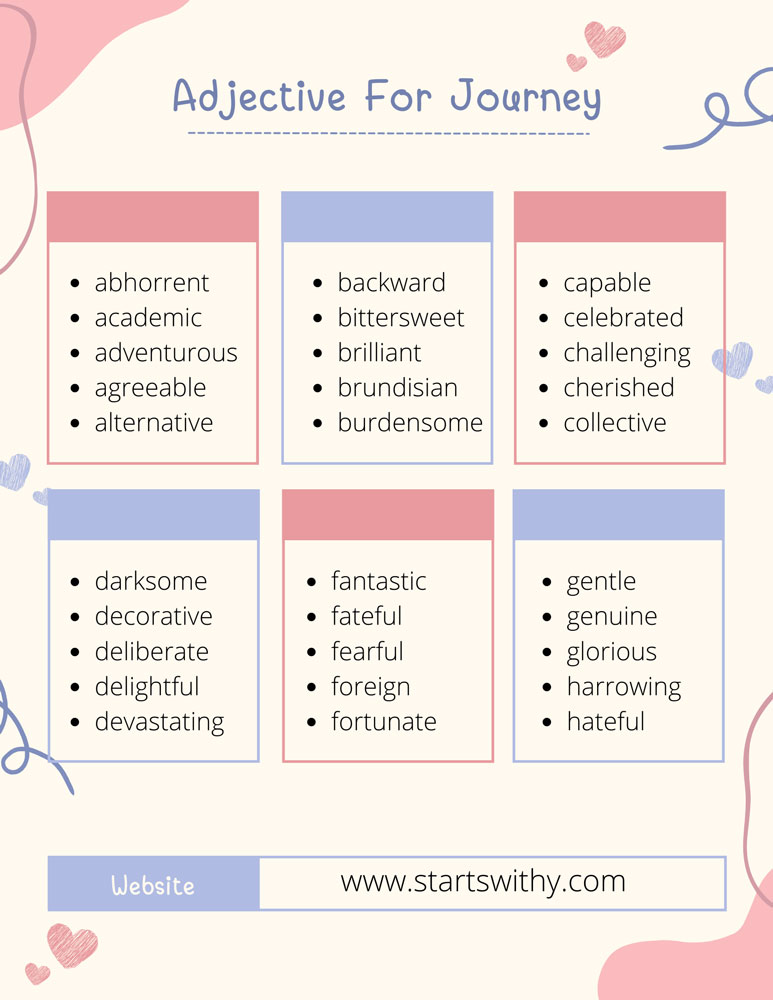
It’s a time to grow and learn. It can be long or short, easy or difficult, but it always has the potential to be life-changing. Here are some words to describe a journey: Exciting, enlightening, challenging, rewarding, fun, eye-opening, transformational. It’s a chance to step out of your comfort zone, to push yourself, to learn and grow. It is an opportunity to create memories that will last a lifetime.
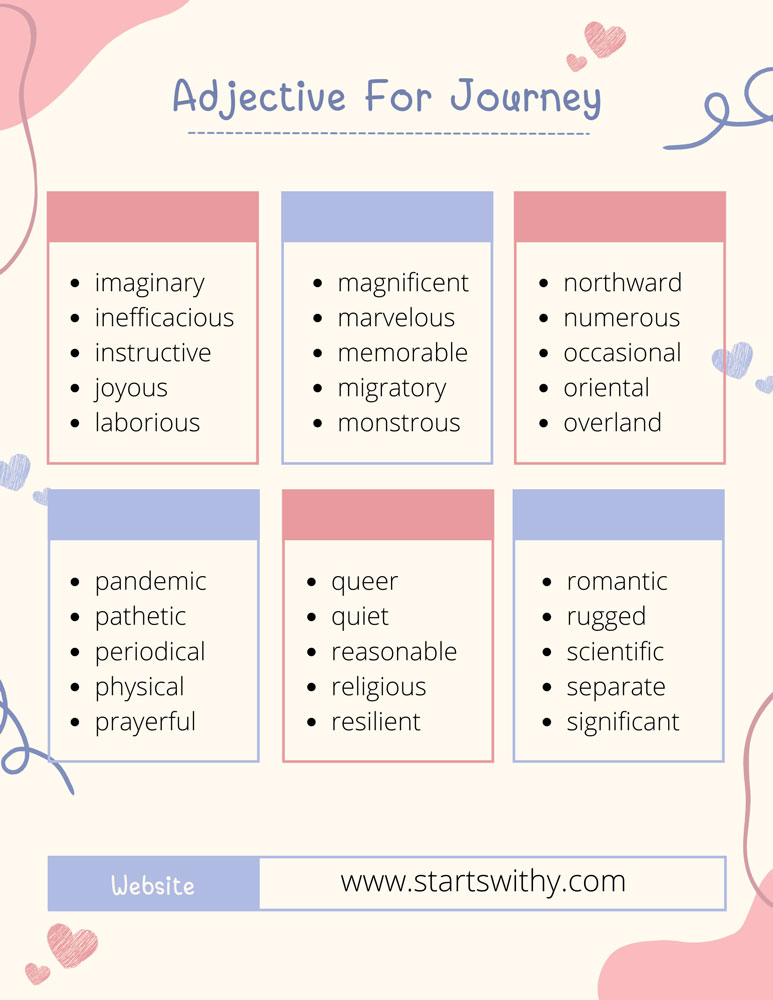
Final verdict
In conclusion, it is evident that there are a multitude of adjective words which can be used to describe a journey. These words can be used to describe the physical aspects of the journey, as well as the emotional rollercoaster that is often associated with embarking on a new adventure. No matter what words are used to describe a journey, it is clear that these experiences can shape and change a person in ways that are both positive and negative.
It is through these journeys that we learn more about ourselves, others, and the world around us.
Leave a Reply Cancel reply
Your email address will not be published. Required fields are marked *
Save my name, email, and website in this browser for the next time I comment.
Related Posts

Describing Blood: Adjectives with Examples
Blood is a vital element of our existence, coursing through… Read More » Describing Blood: Adjectives with Examples

Adjectives for Age: Describing Words & Examples
As we navigate through life, one thing that remains constant… Read More » Adjectives for Age: Describing Words & Examples

Adjectives for Fight: Examples and Describing Words
When it comes to describing a fight, finding the right… Read More » Adjectives for Fight: Examples and Describing Words
107 Best Adjectives to Describe School & Education
School can be described in so many different ways.
It often depends on whether we had a good day or bad day there! And it also depends on which school we’ve gone to.
Below are 107 popular words to describe school that can get you thinking about some creative ways to express your feelings about school and education.
Positive Words for School
Accommodating – Teachers should always be accommodating to your needs. This means they will change the way they teach you to make sure you learn to the best of your ability.
Awe-Inspiring – An awe-inspiring education is one that makes you wonder at the amazement of the world and all the knowledge in it.
Easy – You might use this word if you feel as if you don’t have to make much of an effort and still get good grades.
Effortless – You would similarly use this one if you think perhaps you’re in a class that’s too easy for you and so you don’t study or try, but will still pass with flying colors.
Engaging – An engaging lesson is usually one where the students can actually participate, rather than sitting and watching.
Exciting – If you find learning to be enjoyable and you just can’t wait for the next lesson, you might call school an exciting place.
Exhilarating – If you’re doing a science project and feel like you’re on the verge of a breakthrough, you might consider the project to be exhilarating.
Eye Opening – At school, we learn a lot of new things that expand our horizons and change how we look at things. In these situations, we might walk out of a lesson and say ‘that was eye opening!’
Fantastical – This is a term you might use in a library when you walk in and know you’re going to find another book that will draw you into a fantasy world.
Flexible – A school that will make accommodations for you and your specific learning needs might be described as one that is ‘flexible’.
Friendly – We always hope when we walk into a classroom that there will be lots of friendly faces around us. As a teacher, I always strive to create a friendly environment.
Fun – If you really enjoy all the adventures and activities you’re assigned in class, you might come home and tell your parents: ‘school was fun today!’
Hands-On – A hands-on classroom is one that lets all the students be active participants in their learning, which will help them learn and be engaged.
High Expectations – A school that sets high expectations is one that wants you to do the best you possibly can, and won’t accept anything less.
Important – Most of us believe that learning is one of the most important things we can do so that we can succeed at life.
Inclusive – An inclusive environment is one that ensures everyone is welcomed and a wide variety of views are encouraged.
Inspiring – An inspiring environment is one that will always be teaching you in ways that make you lean in and take interest in the amazing things they’re teaching you.
Interactive – Sometimes schools are not very interactive and students just have to sit and watch. But the good ones make sure everyone gets involved and can do some hands-on activities.
Inviting – An inviting school might be one with lovely artworks of the students around the walls and kind teachers who make you feel welcome.
Kind – A kind school would have teachers who are generous, smiling and patient with you while you learn. It may also focus on teaching the values of kindness.
Life-Changing – A life-changing education would be one that gives you skills to go out and make the sort of life you wouldn’t have been able to otherwise.
Mind-Blowing – You might find a lesson to be mind-blowing if you come out of it feeling as if everything you thought you knew has been totally upended by your new knowledge.
Motivating – You would find it motivating if you really want to wake up every day and go to learn something new.
Participatory – A participatory classroom would be one that allows students to actively be involved in learning and share their opinions.
Safe – Safety is incredibly important in an institution and should be first and foremost. According to Maslow’s Hierarchy of Needs, people need to feel safe and comfortable in order to learn.
Social – A social learning environment would be one were people get to talk to one another while learning. You might also consider school to be social if your favorite part about it is making new friends.
Varied – A varied educational experience might occur if you get to learn about a lot of different things in a lot of different ways.
Warm and Welcoming – You might feel like a classroom is warm and welcoming if you walked in and were instantly greeted by a kind teacher.
Read Also: Metaphors for Teachers

Negative Words for School
Authoritarian – An authoritarian education would be one where the teachers bossed you around and told you what to do and how to think rather than giving you the freedom to make up your own mind.
Boring – Many children think school is boring because they have to sit in a classroom all day. Reading textbooks and doing practice exercises all day doesn’t help either.
Claustrophobic – You might feel claustrophobic in a classroom if you’re an outdoorsy person. You’d feel like a bird locked inside a cage all day long.
Confusing – You might find your lessons to be confusing if the teacher doesn’t make an effort to guide you and teach you content that’s right for your level of knowledge .
Controlling – A school that is controlling might not let students explore, go on adventures, or create things that they want to create.
Demanding – Sometimes your education can be demanding, especially when there are upcoming exams that you need to prepare for.
Demotivating – Some people who might usually be motivated to work on projects become demotivated by the fact school doesn’t give them freedom to explore and be creative.
Depressing – You might describe school as depressing if you go to school day after day and are just consistently unhappy about it.
Detached – A school that seems to be too theoretical and academic, but not practical enough, could be considered to be ‘detached from reality’.
Difficult – If you struggle at school, you might describe it as ‘difficult.’
Directionless – A learning experience might be described as ‘directionless’ if there are no clear goals set for you to achieve.
Frustrating – Many people become frustrated by school if they feel like they’re not making any progress.
Indoctrinating – A school that tells people what to think rather than teaching them how to think critically might be considered an institution that indoctrinates the young.
Inefficient – An inefficient educational institution is one that wastes time on things that don’t lead to learning. For example, if a class is particularly mischievous, the teacher may be forced to waste a lot of time disciplining their students rather than teaching them.
Inflexible – A teacher may be inflexible if they can’t make accommodations for students who need them in order to learn more effectively.
Ivory Tower – The saying ‘stuck up in their ivory tower’ refers to the idea that academics spend all their time thinking and writing about things in isolation from the real world, which makes them detached from the realities of people’s lives.
Lax – This means to lack control. A school that is lax might allow children to get up to too much mischief which means they won’t learn self-control or respect.
Lifeless – A lifeless lesson would be one where the students aren’t talking, the teacher speaks in a monotonous voice, and everyone is bored.
Nauseating – This means that it makes you feel a bit sick. We might say school is nauseating if, when we think of it, it gives us this feeling like we want to get back under the covers and hide.
Noisy – A noisy classroom might prevent students from learning because they are distracted by all the sounds around them. But, a gentle hum of activity might also be conducive to concentration.
Ostentatious – This would be a school that’s too focussed on being impressive, which can be annoying. For example, an elite private school with a helicopter pad in the front yard might be called ostentatious.
Outrageous – You might be outraged by something your child learned in a class, so you might call up the teacher and say: “this is outrageous!”
Overbearing – This means that the teachers are pushing you too hard to succeed. You might consider their endless demands that you study 12 hours a day to be ‘overbearing’.
Overwhelming – When there’s just too much to learn and not enough time, you might become overwhelmed. This is a common feeling in the lead-up to exams.
Quiet – A quiet classroom might be great for learning because you can concentrate. But it also might mean that the teacher doesn’t let you ask questions and talk about what you’re learning with your peers .
Regimented – This means that everything is orderly and the rules are strict. You might call a military college regimented because it makes sure everyone is dressed exactly the same as one another.
Stressful – If you have lots of exams coming up and you’re worried about the results, you might consider school to be stressful.
Strict – A strict teacher is one who doesn’t relax and let students enjoy themselves. The teacher might spend all her time yelling at the students to ‘get back to work’.
Stuffy – A stuffy classroom would be one where the windows are all closed, it’s hot, and you feel yourself sweating. There might also be a lot of dust on the shelves.
Time-Consuming – You could consider 6 – 8 hours a day in a classroom very time-consuming, especially if you think you’ve got a better thing to do with that time!
Uncaring – If a teacher doesn’t pay attention to you and doesn’t seem to concern themselves with your wellbeing, you could consider them to be ‘uncaring’.
Undemocratic – An undemocratic classroom is one where the teacher says “What I say goes. You don’t have a choice!”.
Underwhelming – You might have been really excited about going to class (or college, even) only to turn up and realize the things you’re learning are not very exciting. They’re ‘underwhelming’.
Unfair – A class may be considered unfair if the teacher has given an advantage to some students over others, or who is biased when they grade papers.
Uninspiring – An uninspiring class might be one that’s long, boring and doesn’t make you excited about the subject .
Uninviting – A school that is uninviting might be all grey without any pictures on the walls, color around the place, or smiling teachers there to welcome you.
Unoriginal – An unoriginal education might be one that’s full of dusty old textbooks, information that’s not taught in an interesting way, and no new ideas to present to students.
Unrealistic – If you consider school to be unrealistic, you might think that the things they want you to doo are just far too hard for your ability level, so it’s unfair for them to set you those tasks.
Unsatisfying – You might be unsatisfied if you took a class and by the end of it you didn’t learn anything new or interesting.
Read Also: 23 Metaphors about School and Education
Other Words for School
Academic – An academic institution has a strong focus on theory, bookwork and tests but not much emphasis on emotional development of the student.
Challenging – A challenging education would be one that sets high expectations, is difficult to complete, but also would be rewarding once you overcome the challenges that were set.
Disciplined – A disciplined school would be one that has educators who ensure students are well-behaved at all times.
Educational – If you said school is educational, you’re saying you learn stuff when you go to school – one would hope this is the case!
Helpful – You would like your teacher to be helpful, but that’s not always the case so it’s worth telling them they were helpful if they were!
Prestigious – A prestigious school would be one that is well-known for creating future leaders in science, business and politics.
Read Also: Metaphors for Students
Words for Different Types of Schools
Agricultural – Agricultural schools are usually located in rural locations and provide education to the children of farmers, who often go into the family business after completing their education.
Blended – A blended classroom is half in-person and half online. This is becoming
Boarding – Boarding schools have the students sleep at the school, like in Harry Potter . They’re common for students whose families live in very remote locations such as some farmers.
Co-Educational – Co-Educational schools educate both girls and boys.
Elite – An elite school is one that is hard to get into because it has high entry requirements and high costs. It would also likely be a legacy school where children of alumni get preferred access.
Free – A free school is the one down your street that’s funded by the government!
Godly – A Godly school would be one that’s based on a Christian, Muslim or other religious ethic.
Home schooling – Home schooling is when you get educated at home. This is often because the parents do not agree with the ways schools go about teaching children.
International – International schools often follow an international curriculum such as the International Baccalaureate and will take students from around the world.
Local – Everyone has a local school which is usually small, free, and integrated into the community.
Online – In recent years, online education has become more and more popular. You might go to an online university so you can work during the day then study on the internet when you have free time.
Private – A private education is one that’s not paid for by the government. It usually has more freedom to create its on curriculum that is often based on a religious doctrine.
Public – We usually use ‘public’ to explain an government-run school, although some nations flip this and use it to explain non-government-run schools.
Rural – A rural school might have its own flavor, such as a stronger emphasis in farming and agriculture.
Single-Sex – Girls’ and Boys’ schools are becoming less common, but do continue to exist, particularly among elite schools whose ethos is that gender mixing can be a distraction to learning.
Technological – A technological institution would be one with a strong focus on computer sciences and the use of up-to-date technologies in the classroom.
Urban – An urban school is one that’s based in a city. It might reflect the multicultural dynamic evident in many cities which may lead to a rich tapestry of cultures being learned about in the school.
Vocational – A vocational college has a strong focus on job readiness skills rather than academic learning.
Descriptions of Approaches to Education
Behaviorist – A behaviorist learning experience has a strong focus on ‘reward and punishment’ based on theories from behavioral psychologists like Pavlov and Skinner.
Community-Oriented – A community-oriented school will invite prominent community members into the classroom to integrate students with their community.
Conservative – A conservative educational institution would focus on tradition and the core learning skills of reading , writing and arithmetic.
Constructivist – Constructivist learning involves a lot of hands-on activities that allow students to ‘construct knowledge through experience’.
Democratic – Democratic classrooms are ones where students have a voice, voting to make decisions is common, and the teachers respect students’ opinions.
Didactic – A didactic education will involve a teacher who focuses on moral instruction and does more talking than listening.
Humanist – A humanist education involves a strong focus on students’ emotional development and their personal wellbeing with the belief that wellbeing, comfort and having your basic needs met are prerequisites for optimal learning.
Moral – A moral education differs from an academic education. Academic schools are usually secular and teach you how to think, while strictly moral education will teach you right from wrong .
Multicultural – A multicultural education will allow students to see the world from varying cultural perspectives and learn to respect cultural diversity in their community.
Personalized – A personalized learning experience will mean that you get to learn things that are relevant to you personally and you get to learn in ways that you find fulfilling. You might learn different things (or in different ways) to your peers.
Practical – A practical education will have a stronger focus on ‘doing’ and less focus on bookwork so students are prepared with workforce and life ready skills.
Progressive – Progressive education (based on John Dewey) is concerned with creating fairness in the classroom, promoting democratic values, and individualized learning plans.
Socratic – A Socratic education will involve philosophical discussions whereby the teacher will poke and prod at your presumptions and require you to defend your beliefs with logic and argument.
Student-Centered – A student-centered education will differentiate instruction for students so each student gets personalized lessons that meet their needs.
Teacher-Centered – A teacher-centered education will involve the students focussing on the teacher’s instruction and students need to sit passively and listen to the teacher’s lectures.
Theoretical – A strongly theoretical institution will have more of a focus on philosophy, debate, and textbooks rather than practical education preparing you for a job.
The above list of words and adjectives to describe school are by no means the only ones! But, they’re a useful list to get you thinking about people’s experiences of education and how they differ. If you don’t like any of the above adjectives, feel free to add your own adjectives to your own list!
If you’re after more words to describe education related topics, consider taking a look at my articles on words to describe students and words to describe teachers .

Chris Drew (PhD)
Dr. Chris Drew is the founder of the Helpful Professor. He holds a PhD in education and has published over 20 articles in scholarly journals. He is the former editor of the Journal of Learning Development in Higher Education. [Image Descriptor: Photo of Chris]
- Chris Drew (PhD) https://helpfulprofessor.com/author/chris-drew-phd/ 5 Top Tips for Succeeding at University
- Chris Drew (PhD) https://helpfulprofessor.com/author/chris-drew-phd/ 50 Durable Goods Examples
- Chris Drew (PhD) https://helpfulprofessor.com/author/chris-drew-phd/ 100 Consumer Goods Examples
- Chris Drew (PhD) https://helpfulprofessor.com/author/chris-drew-phd/ 30 Globalization Pros and Cons
Leave a Comment Cancel Reply
Your email address will not be published. Required fields are marked *
Classroom Q&A
With larry ferlazzo.
In this EdWeek blog, an experiment in knowledge-gathering, Ferlazzo will address readers’ questions on classroom management, ELL instruction, lesson planning, and other issues facing teachers. Send your questions to [email protected]. Read more from this blog.
How to Make Summer School Effective and Engaging

- Share article
Today’s post finishes up a two-part series on how to make summer school a place that students want to attend ...
‘What Is the Instructional Purpose?
Kathy S. Dyer is an educator who has served as a teacher, principal, district assessment coordinator, and adjunct professor:
The tag line of the National Summer Learning Association (NSLA) , Summer Changes Everything TM , says it all. As educators leading summer learning programs, we can keep kids learning, engaging and empowering students to finish the unfinished learning and to take their unique skills (and confidence) to the next level. Prioritizing the way forward for learners using summer learning programs as a vehicle can be empowering. Consider these questions as you look for ways to make summer learning more enticing (and effective).
1. What is the instructional purpose of the summer learning program ? Is it remediation, credit recovery, preventing skill regression? Enrichment, extension, or moving ahead? Is it for language immersion? Or is it getting ready for the next grade?
2. Who is delivering the services ? Experienced teachers? Paraprofessionals? Teacher-candidates? Are these teachers who want to be there?
3. What are the expectations for program content ? Reuse school year curriculum? Aligned to standards? New work or a strengthening course? Customized to consider the cultural context of the school and the learners? How will fun be incorporated?
That last question may be the crux of the summer school challenge. Parents want a program that is going to advance their child academically and is also going to allow them to have fun. Learners want to “get it over with,” so if fun can be part of the learning experience, it becomes something different (perhaps) from what happens during the school year.
Based on my experiences as summer school principal, I would say there are a few key ideas that can make the program more enticing for students (and staff).
- Time: Consider one class a day for a block period (three hours) for four weeks. It is easy for students who work to plan their schedule, as well as for parents.
- Course variety: Offer a range of courses depending on your identified purpose. Include options such as required courses and engaging topics.
- Interactive learning: Implement hands-on activities, group projects, and experiments that promote active learning. The block schedule allows time for these. Incorporate educational games, field trips, and guest speakers. If a block schedule is new to staff, offer professional learning on the topic.
- Relevant learning: Emphasize the practical applications of the knowledge taught. Show students how the concepts they learn in summer school relate to their life and what comes next in school.
- Supportive environment: Maintain small class sizes to allow for personalized attention. Create a positive and inclusive atmosphere.
And, last but not least, if you have a building in your district with air conditioning, and it is possible to hold the summer program there, do so, for everyone’s sake.
My question to school districts is: How could your summer school program look so learners wouldn’t want to miss it?
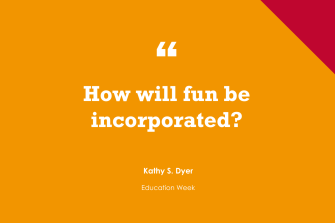
‘Creative Writing Summer Camp’
Altagracia H. Delgado, also known as Grace, has been in the education field for 28 years. She is currently the executive director of multilingual services for Aldine ISD, in the Houston area. She is also an elected board member of the Texas Association for Bilingual Education:
Commonly, students come to summer school because they have failing grades or have not passed the state assessments during the year. In addition to this, most English learners come to summer school because they need additional time learning their second language or, in middle and high school, they need to recover credits to continue a pathway for graduation.
However, none of these reasons implies that summer school cannot be engaging or fun for students. Investing in enrichment programs that can combine content, credit earning or recovery, and English-language development can be a great way for students to have effective and empowering experiences during the summer school session.
One way in which we have been able to engage high school students in English credit recovery while developing their new language is by developing a creative writing summer camp. This summer session provides students with opportunities to work with an author, develop reading and writing skills while expressing themselves through personal narratives, and to create and develop characters for a play that is performed at the end of the session. This public-performance addition to the camp helps our students practice listening and speaking skills in a more creative way.
Because we wanted our students to have formal and informal speaking practices, in preparing for the play, they also had the opportunity to work on the creation of props, background and costumes while practicing their parts. To close out this experience, students’ parents and guardians and English-learning students in primary grades were invited to attend the high school students’ performance. The incorporation of the final performance really gave our high school students something to look forward to because they understood that they were modeling language for our younger learners.
At the end of the final performance, our primary students were able to interact with the now actors, ask questions, and get their autographs. Feedback from the high school students gave us great insight. They shared that they felt more confident about their language-acquisition skills and expressed pride for being brave in a public space.
We understand that due to the academic load many of our students carry to continue their graduation pathways, sometimes creative outlets are not accessible to them. But what we also have learned from this experience is that when we listen to students’ interests, we can learn how to integrate these into lessons that can become more meaningful to them and stretch them in the learning, while also building their confidence.

Supporting Newcomers
Aisha Ansari and Elena Ruiz direct Aspire & Reach Educational Consulting Services , which customizes curriculum and provides professional development and/or coaching sessions to drive student success:
We helped develop a summer school program rich in language acquisition for newcomer students. In the state of Texas, the term “newcomer” is used when addressing the language instructional program (Bi/ESL) of students born outside the United States.
Our school district designed a program last summer that included eight days of rigorous oral production using interactive magazines, as well as a parent and student showcase of work. The use of sentence starters and sentence frames was highlighted as one of the strategies to support students in speaking, reading, and writing. Students were able to read and convey their hard work and ideas in an instant thanks to the use of simple sentence-frame starters!
The Summer Language Program was centered on thematic science lessons in which all learners were engineers and designed—to name a few—cars, boats, and roller coasters. One of the final activities was a field trip to the Museum of Natural Science, where students gained experiences and made connections to classroom concepts.

Thanks to Kathy, Grace, Aisha, and Elena for contributing their thoughts.
Today’s post responded to this question:
What should be done to make summer school more enticing to students, and effective?
In Part One , Diana Laufenberg, Chandra Shaw, and Michelle Shory offered their suggestions.
Consider contributing a question to be answered in a future post. You can send one to me at [email protected] . When you send it in, let me know if I can use your real name if it’s selected or if you’d prefer remaining anonymous and have a pseudonym in mind.
You can also contact me on Twitter at @Larryferlazzo .
Just a reminder; you can subscribe and receive updates from this blog via email . And if you missed any of the highlights from the first 12 years of this blog, you can see a categorized list here .
The opinions expressed in Classroom Q&A With Larry Ferlazzo are strictly those of the author(s) and do not reflect the opinions or endorsement of Editorial Projects in Education, or any of its publications.
Sign Up for EdWeek Update
Edweek top school jobs.

Sign Up & Sign In


IMAGES
VIDEO
COMMENTS
Model Answer 2: Thank you very much for the time and opportunity that you have given me here to talk about my jourey to my office. I typically commute to my office by public transportation, specifically by bus. The journey begins with me walking a short distance from my home to the nearest bus stop. Once there, I board the bus that takes me ...
Travelling is useful in many ways. First, its one the best ways to meet new people and make friends. Secondly, it enables us to learn about new cultures and traditions. Travelling also in a way breaks the monotony of everyday life. There is something very enjoyable about planning a holiday and visiting other places. 4.
The activities you participate in as part of school (e.g., sports, performing arts, etc.) The learning that you are doing outside of school (e.g., community language class) In what ways are your personal experiences shaping your story? Describe how the following experiences are helping you "become": Major life events; Favorite activities
Describe your journey to your school or office. You should say: what type of transport you use. how long it takes. whether you use the same type of vehicle always. and explain if you enjoy it or not. [You will have to talk about the topic for one to two minutes. You have one minute to think about what you are going to say.
The name of my school was Birla Bharati and I joined this school as a Class 2 student. I remember the journey from my house to the school gates distinctly. My father escorted me to the school premises on his motorbike. Once we reached the school, my father walked me up to the point where the parents of the students were allowed.
Describe your journey to your school or office. v.1. Describe your journey to your school or office. You should say: what type of transport you use how long it takes whether you use the same type of vehicle always and explain if you enjoy it or not. [You will have to talk about the topic for one to two minutes.
Sample Answer 3. Journeys, after all, are always unforgettable. It exposes us to new experiences and allows us to unwind ourselves. I like traveling because it allows me to explore new places and experience new things around the world. However, there are certain travels on which I have had less than good encounters.
You should say: where you went. how you travelled. why you made the journey. and explain why you remember this journey well. [You will have to talk about the topic for one to two minutes. You have one minute to think about what you are going to say. You can make some notes to help you if you wish.]
Answer: Yes, I have always travelled to my work in the same way with my bike mainly because using a bike is very convenient for me since I have the freedom to go anywhere at my own pace. Besides, I have found out that travelling on my bike costs me significantly lesser than travelling in a public bus which, by the way, is not very reliable ...
In addition to the above advantages, wines provide: favorable rates; cleaning in a short time; excellent quality results; greater than 100 positive evaluations. Cleansing workplaces will aid keep your work environment in order for the most effective job. Any type of firm is extremely essential atmosphere in the team.
One tip for people in this position is to develop a simple three-part script. A little preparation can provide you with a conversational guide / safety net. It may seem obvious, but sometimes ...
We sang songs loudly and smiled a lot. The wonderful sceneries around us and our favourite music in the car made the whole journey more thrilling and enjoyable. It was really a day of excitement and enjoyment. As far as the reason goes, I decided to make this journey by car because my companions thought that it would be more amusing and relaxing.
IELTS Speaking Part 2. Describe an important journey that was delayed. You should say: Model Answer. I would like to talk about the time when my journey was delayed due to the bad weather. I can't remember precisely when it was because I have a terrible memory for dates, but it was several years ago when my besties and I decided to make a 3 ...
It can be a journey to another city of your country, to a historic or tourist place, a foreign country or to a relative or friend's house to a different location. While talking about this cue card, take some notes of a journey you remember particularly where you went, what was the purpose of going there, how you traveled there, what you saw ...
Describe a school that you went to when you were a child. You should say. - where the school was. - when you went there. - what the school and the teachers were like. - and explain whether you enjoyed your time there. Tip: try telling a story for the last point e.g. talk about a particularly enjoyable event that you remember.
Describe a journey [e.g. by car, plane, boat] that you remember well. You should say: where you went. how you travelled. why you went on the journey. and explain why you remember this journey well. [You will have to talk about the topic for 1 to 2 minutes. You have one minute to think about what you're going to say.
Highlight your relevance. 2. Showcase your accomplishments. 3. Explain your challenges. 4. Express your enthusiasm. 5. Here's what else to consider.
Adventure: When describing an adventurous journey, you want to highlight the excitement, thrill, and sense of exploration. Adjectives like "thrilling," "exhilarating," "daring," and "wild" can help convey the adrenaline rush and the sense of stepping into the unknown. Serenity: For a more peaceful and calming journey, words like ...
Subject: English. Age range: 11-14. Resource type: Worksheet/Activity. File previews. docx, 12.01 KB. Some resources to help students to write about their journey to school. It includes a plan and activities to help them to write similes, metaphors and senses. This resource is designed for lower ability and EAL students.
Suddenly a branch of tree overhead fell beside me with a hard sound. This made me jump and say, "I thank God it didn't hurt me.". While crossing a park on my way I saw two lovely squirrels ...
A journey is an adventurous and exciting experience. It is a journey of self-discovery and growth. It can be physical, mental, emotional, or spiritual. It can be a journey to a new place, or a journey within yourself. It is full of ups and downs, twists and turns. It is a journey of learning and… Read More »550+ Adjective Words To Describe Journey
Detached - A school that seems to be too theoretical and academic, but not practical enough, could be considered to be 'detached from reality'. Difficult - If you struggle at school, you might describe it as 'difficult.'. Directionless - A learning experience might be described as 'directionless' if there are no clear goals ...
Show students how the concepts they learn in summer school relate to their life and what comes next in school. Supportive environment: Maintain small class sizes to allow for personalized ...